Best electronic drum set for kids 2025: child-friendly electronic drum kits
Get your child off to a flying start on the drums with these affordable, entry-level e-kits and drum pads, selected specifically for kids
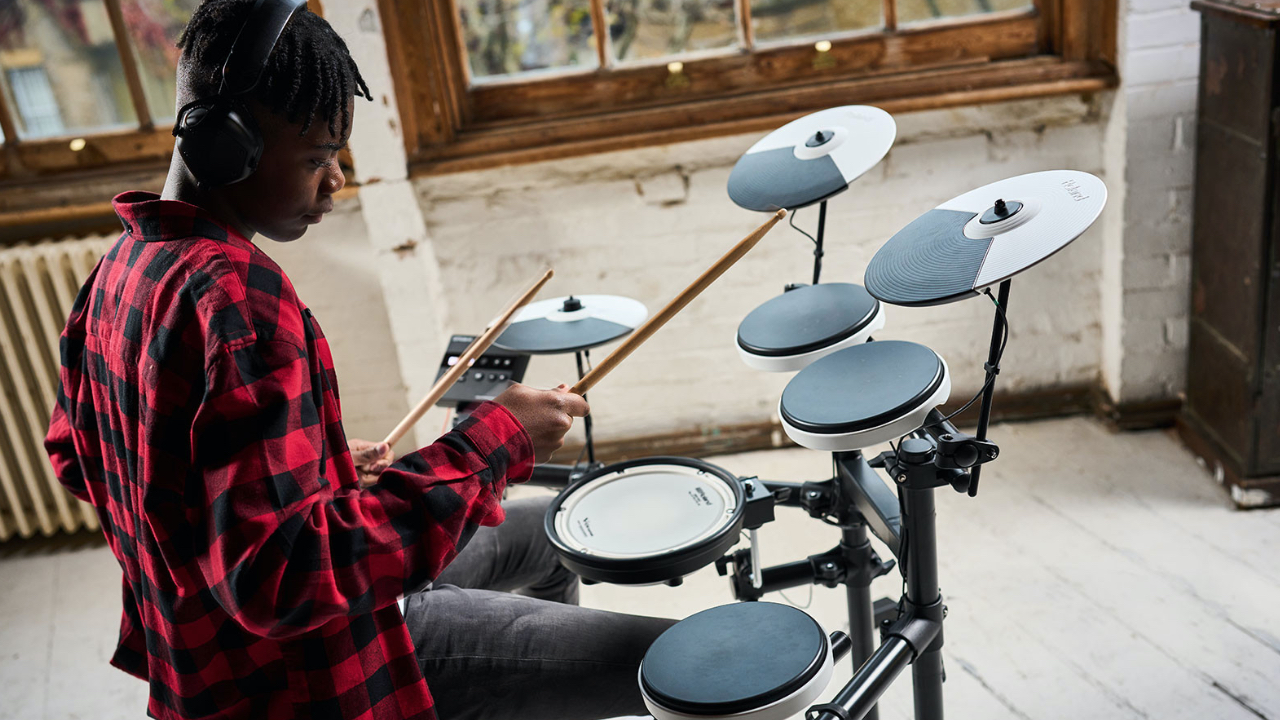
An e-kit is the ideal first instrument for any budding musician, and particularly younger players. Hit a drum and it instantly makes a sound, and in my experience most people can pick up a basic drum beat with very little effort. The best electronic drum sets for kids are also quiet, compact and affordable compared to acoustic drums, making them the most family-friendly choice. E-kits also promote regular practice at home, meaning development can potentially be quicker with a little effort.
With so many features trickling down from higher-end electronic kits - from learning tools, to high-quality sounds and responsive pads - child-friendly electronic drum sets now deliver an accessible, authentic and inspiring playing experience for young players.
This hasn't always been the case. In my 20 years+ of testing electronic drums, I've seen the children's e-kit bracket morph from cheap, poor quality and terrible-sounding e-drums, to capable kits that offer features that were once reserved for more expensive kits, such as mesh pads and adjustable hardware.
In this guide, I'm looking at the best e-kits for kids that will help younger or smaller players take their first steps with the instrument - with options for almost any budget. I've included demo videos or some of my recommendations, too. Right now, my top choice is the Alesis Turbo Mesh. Alesis is at the top of its game when it comes to quality budget drum gear, and the Turbo Mesh is a fine example of fantastic, child-friendly features, alongside a parent-friendly price point ($/£299).
While I would always recommend going straight to a full kit with individual pads, I've also included one 'desktop drum pad' option, which houses a number playing surfaces within a compact tabletop unit. They're a great introduction to the concept of drumming, but won't deliver the full experience, so unless space is an issue I wouldn't put this at the top of your list.
I also haven't included any 'toy' kits. These can be a great introduction to the idea of drumming from a young age, but once it's time to learn to play properly, the tried and tested kits in this guide are where I would start.
This list is deliberately short, too. I know, as a parent myself, how easy it can be to get overwhelmed by lots of similar options, so this guide only features the products I would genuinely recommend.
My top picks
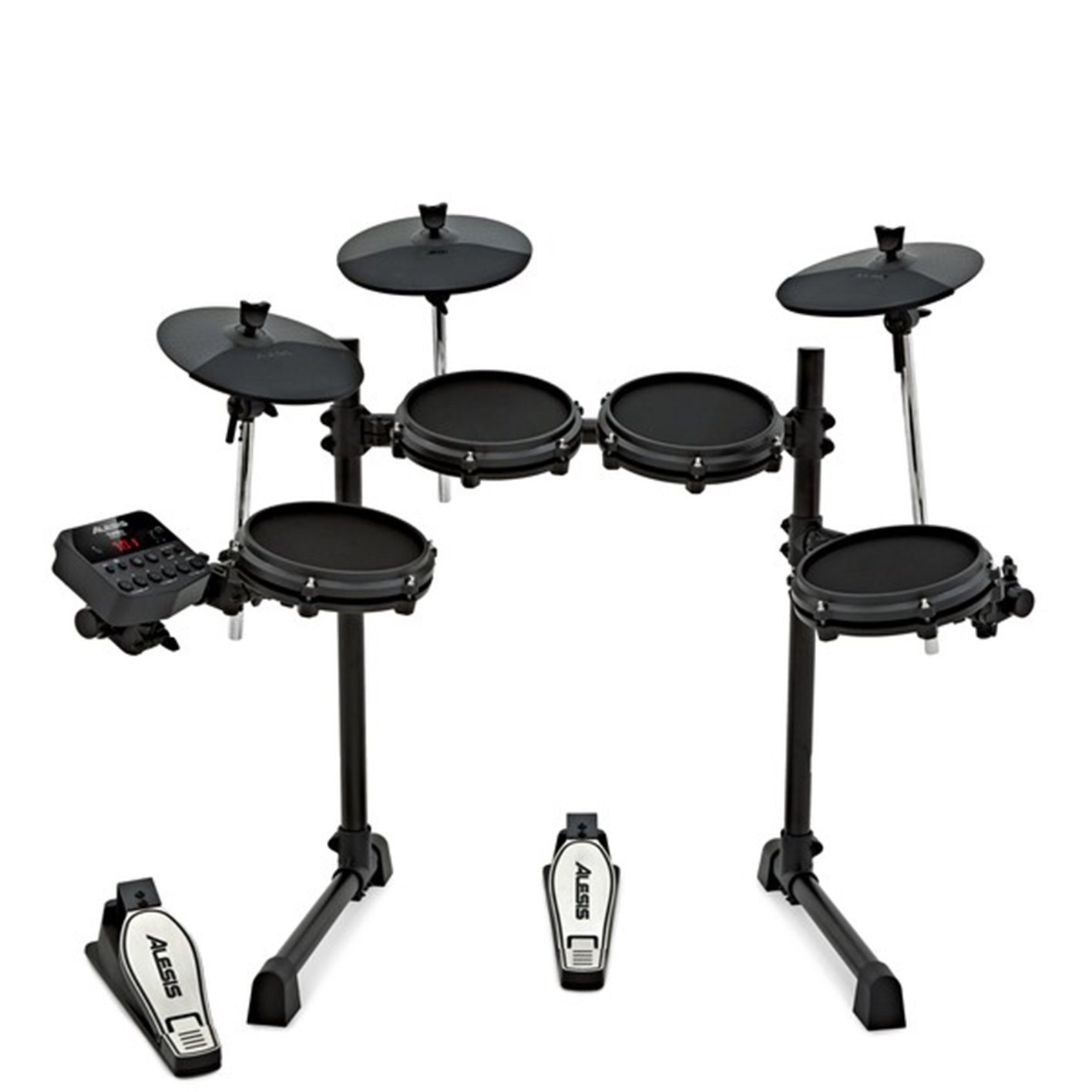
This kit is the perfect option for kids. I found it simple to set up, and the minimalist design means it won't take up loads of space. The module is easy to navigate and includes a coach mode to help you progress. But the icing on the cake is the full complement of mesh heads for a realistic playing experience.
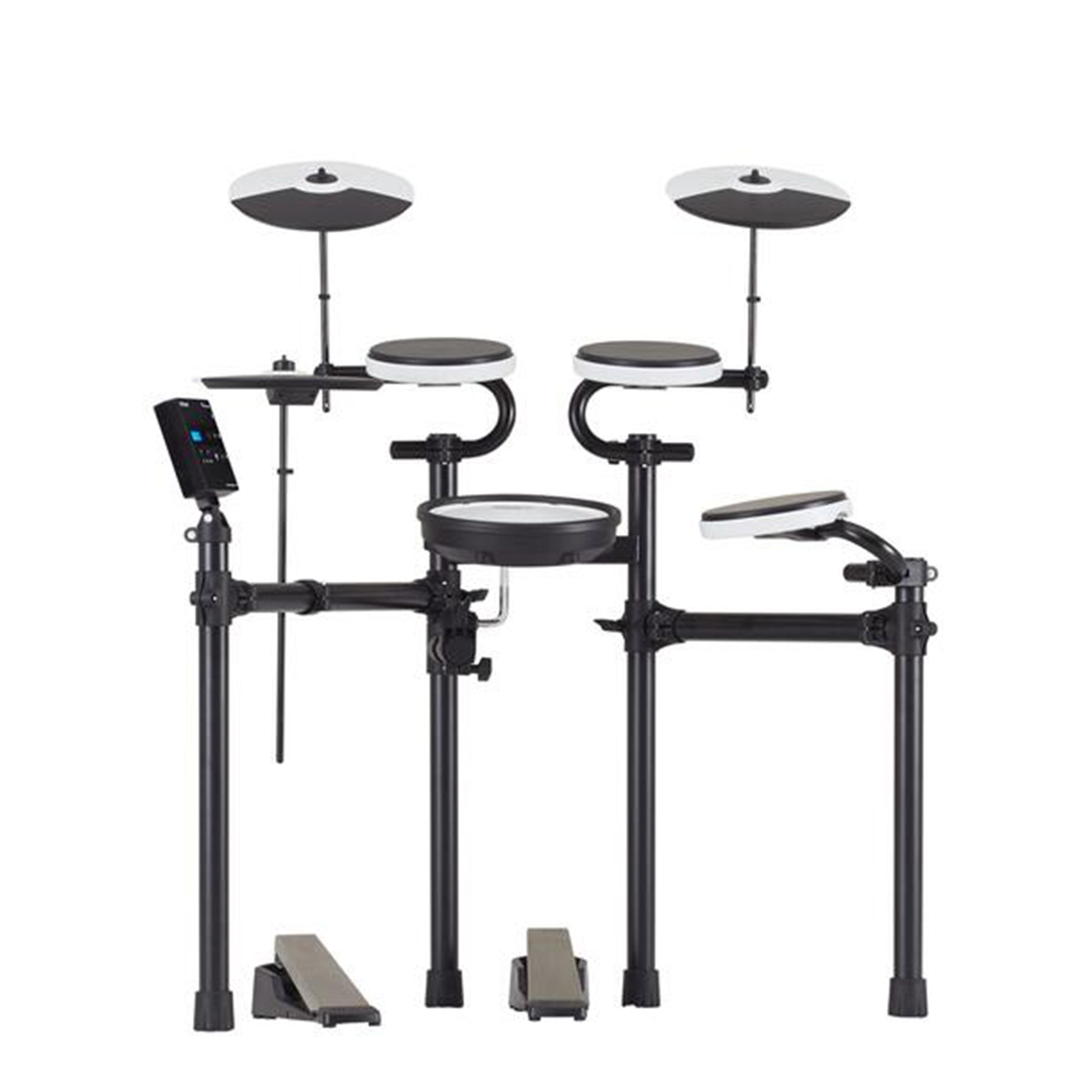
It's not the cheapest kit, but Roland is the biggest brand in e-drums and this, in my opinion, is the best entry point to a trusted brand that makes high-quality, long-lasting gear, and won't need upgrading for some time. I selected this kit as it includes a fantastic mesh snare drum pad and great kit sounds.
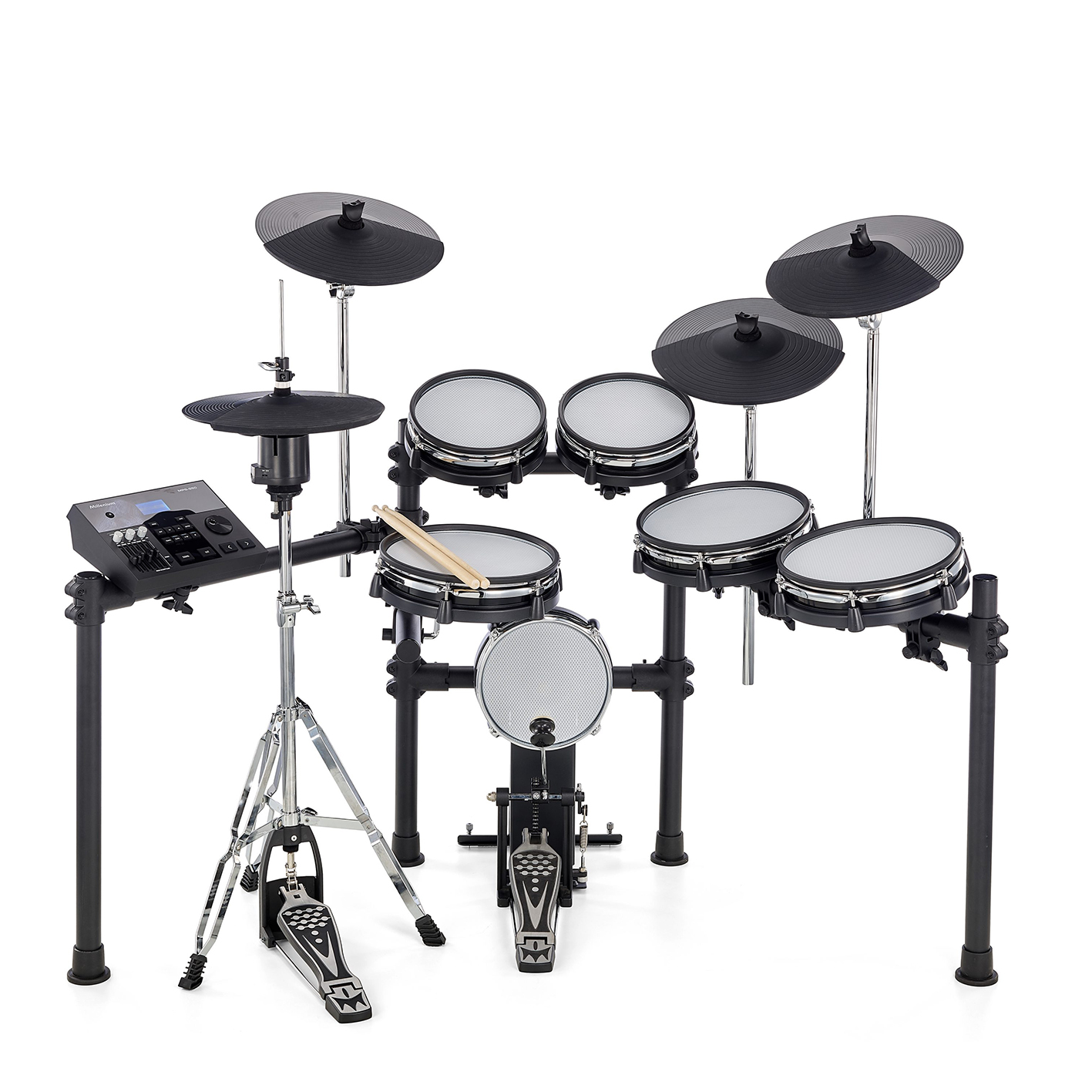
German retailer Thomann knows a thing or two about producing quality gear for those on a tighter budget. The MPS-850 is no exception, with this e-kit bundle delivering a fantastic value package that includes 10 drum and cymbal pads, plus a bass drum pedal and hi-hat stand. If it's a bigger kit you're after, this is the one.
Best overall
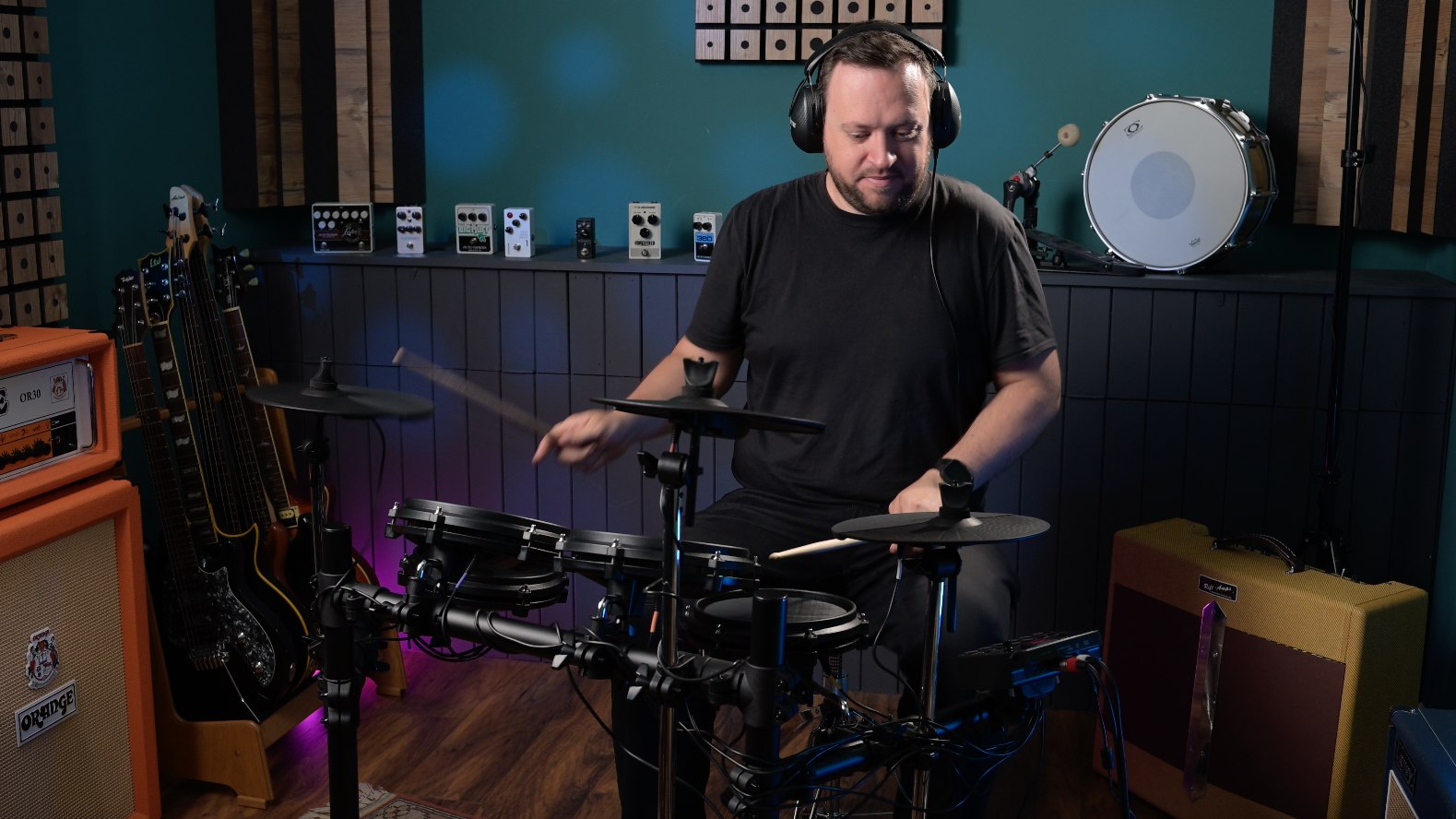
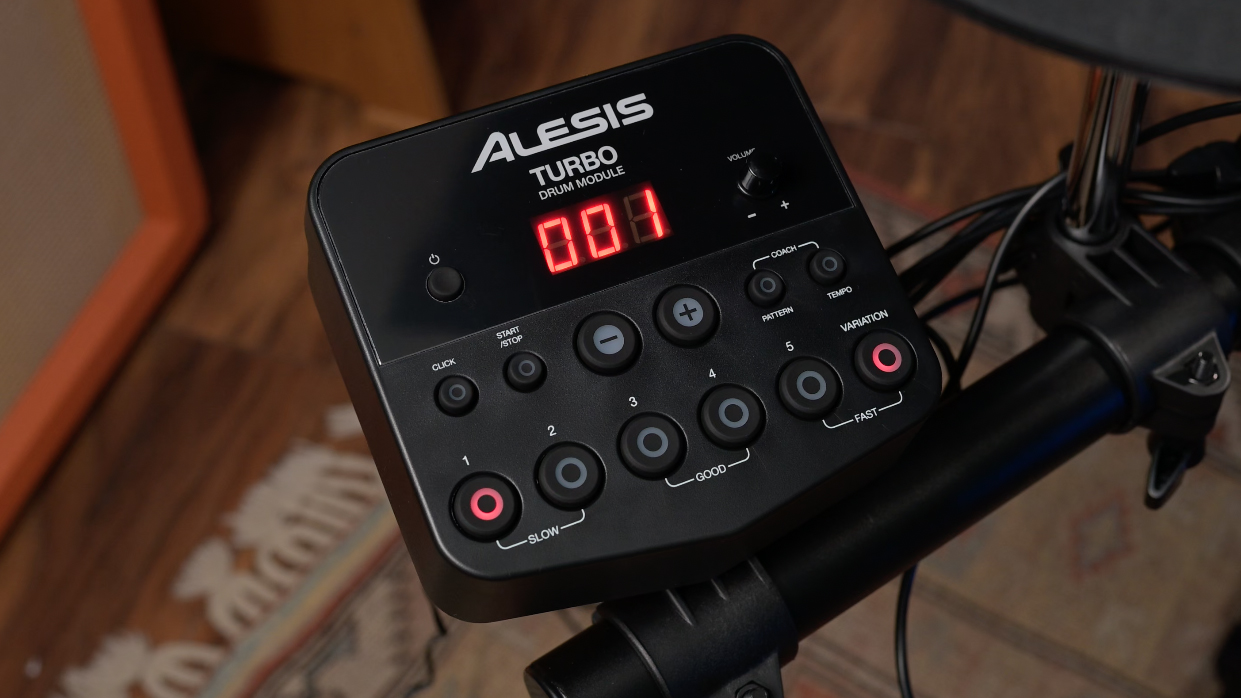
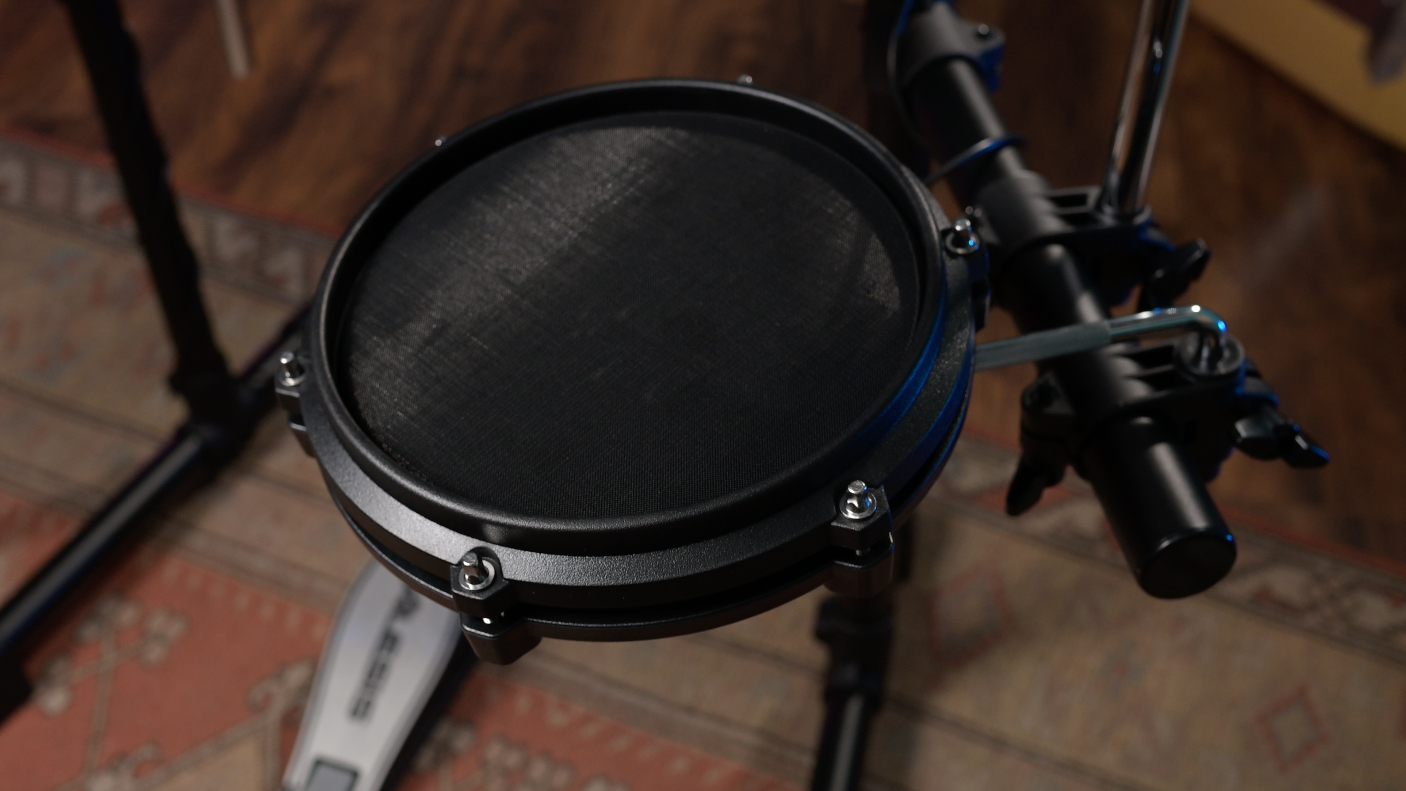
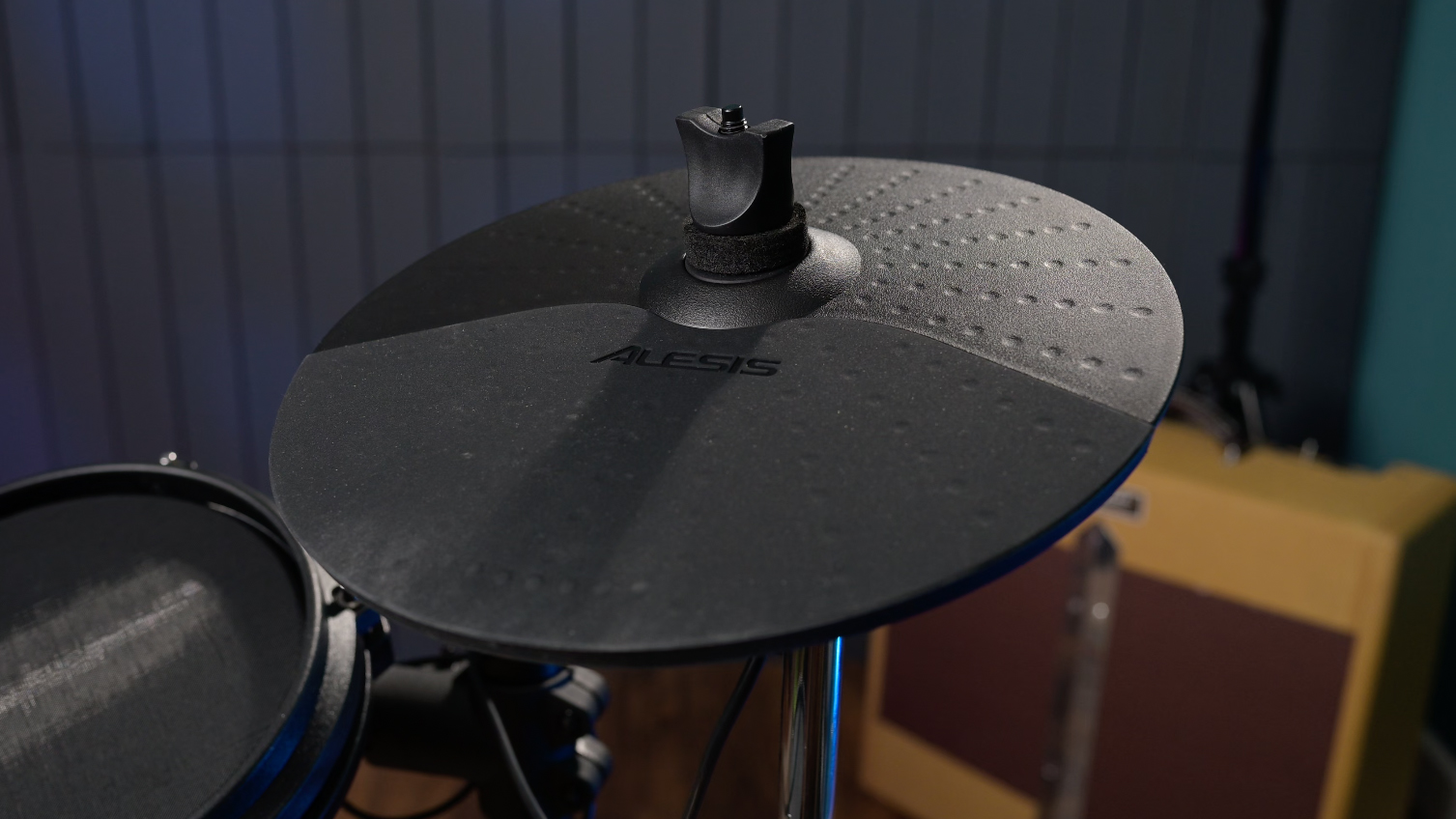
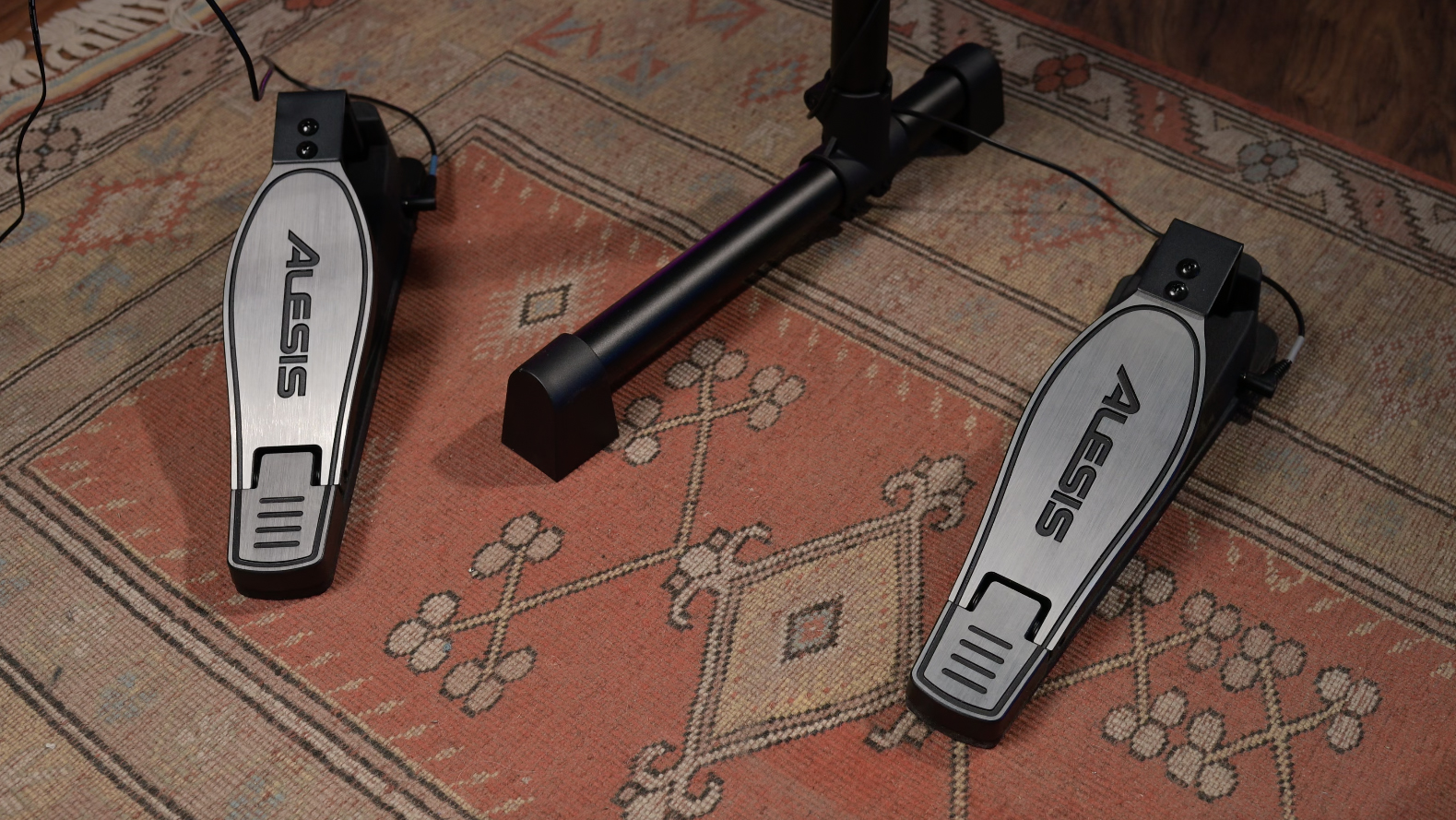
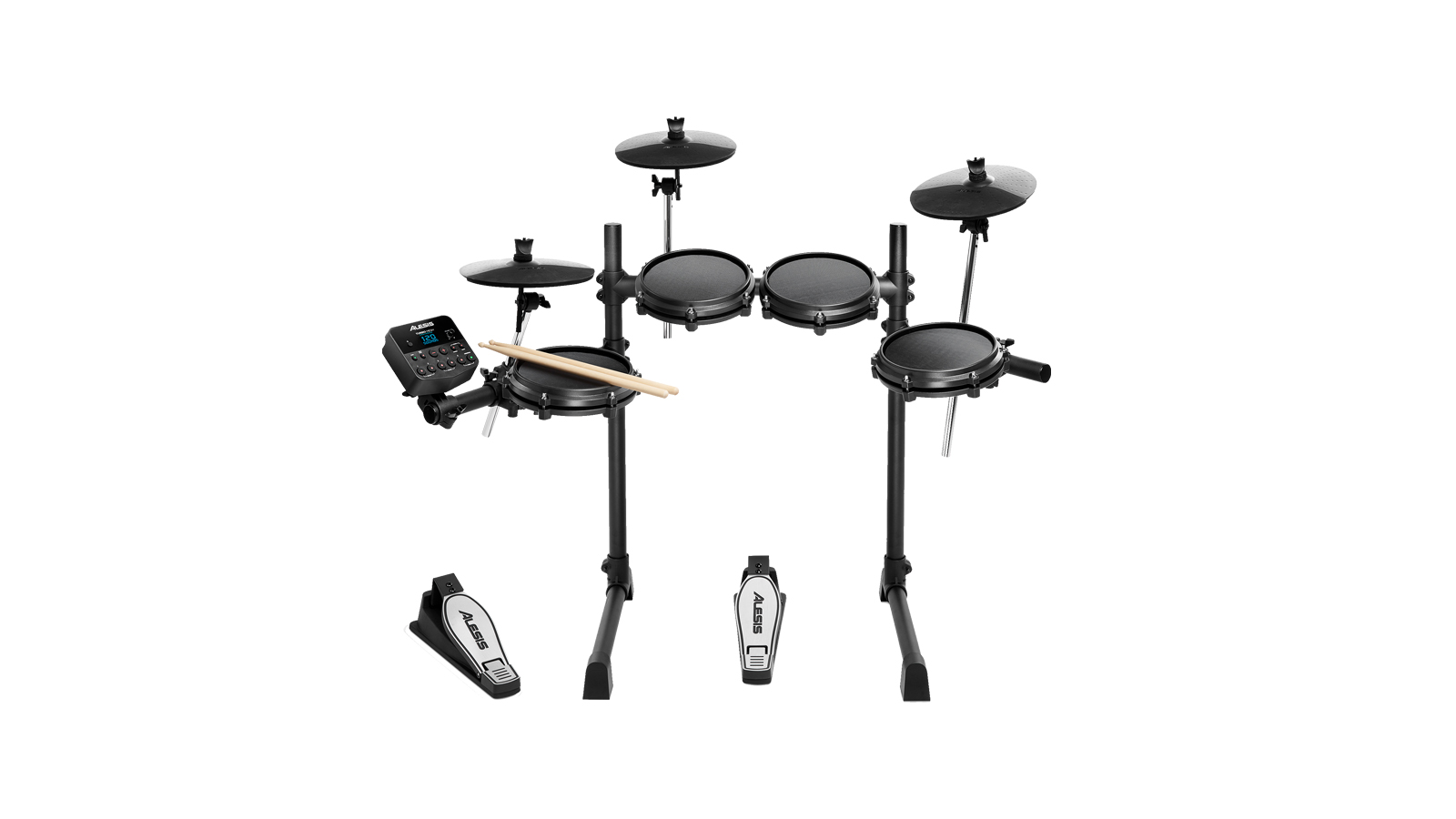
Specifications
Reasons to buy
Reasons to avoid
✅ Buy if you want mesh heads on a budget: Mesh heads on every drum at this price point used to be a thing of fantasy, but Alesis made it a reality. There's no better alternative to the authentic feel of mesh.
❌ Avoid if sounds are most important to you: While the Turbo Mesh is truly capable, the sounds are the best out there. But, honestly, that's the case for every kit at this level.
What is it? The Alesis Turbo Mesh is perfect for kids and beginner players alike. We found the module simple and easy to use, featuring 10 drum kits and 120 sounds. The sounds aren't going to win any awards for their bombastic, high-fidelity, but if you're after a great rock or pop kit and a collection of fun sounds that will appeal to youngsters, you'll find plenty of what you're after in this module.
Features & performance: There's a coach mode which grades you on how well you play along with different time signatures, as well as 30 play-along tracks and a metronome. These modes features are essential for kids when starting out on the drums.
This kit comes complete with mesh heads across all drum pads, plus a drum key and a pair of drumsticks in the box, meaning - providing you’ve got a seat or drum throne on standby - you’re ready to go right out of the box! Kids will love how many cool features there are to play with here and will be happy to get stuck straight in.
The module is low profile too, without too many unwieldy or space-taking tubes, so it should fit in most compact spaces. The height of the pads can be adjusted to a fair degree too, so they can be raised as your child grows.
Overall, we found the Alesis Turbo Mesh to be an excellent value electronic drum set. As with all the Alesis electronic drums we've tested over the years, the mesh heads on this kit feel great and almost as realistic as an acoustic drum head, the drum sounds are great for the price and the coaching modes on-board the module are will help your child learn their first rhythms and master time-keeping. If you’re on a budget or just looking to have a go at drumming, this kit is well worth your money.
Watch our demo video:

"The Alesis Turbo Mesh is a fantastic electronic drum kit for anyone who’s looking to give the drums a go for the very first time. For the money, the build quality is pretty hard to beat, the all-mesh pads are a boon at this price and the compact footprint means it’s more convenient than ever to have an e-kit in your home."
Read more: Alesis Turbo Mesh review
Best Roland kit for kids
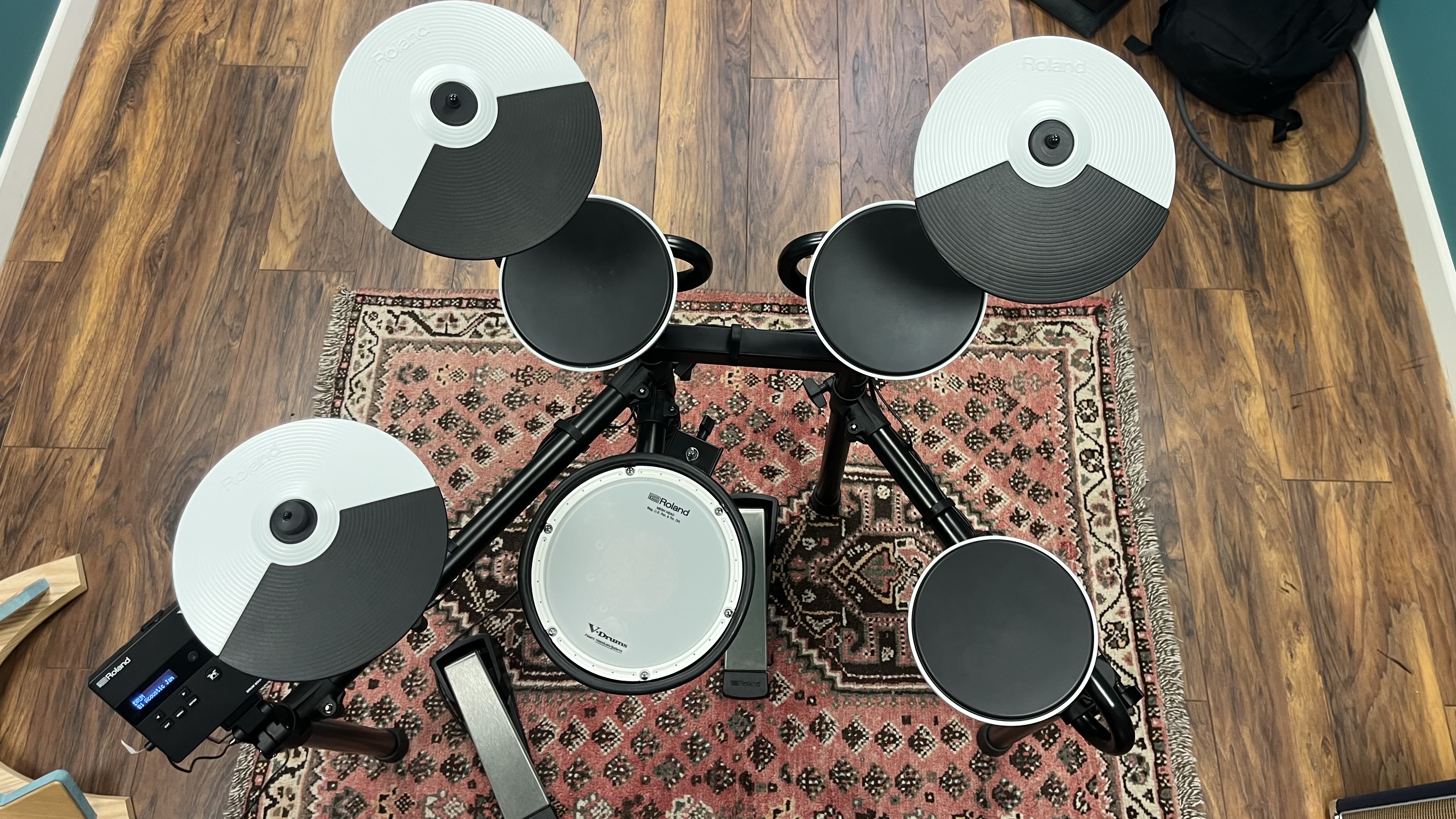
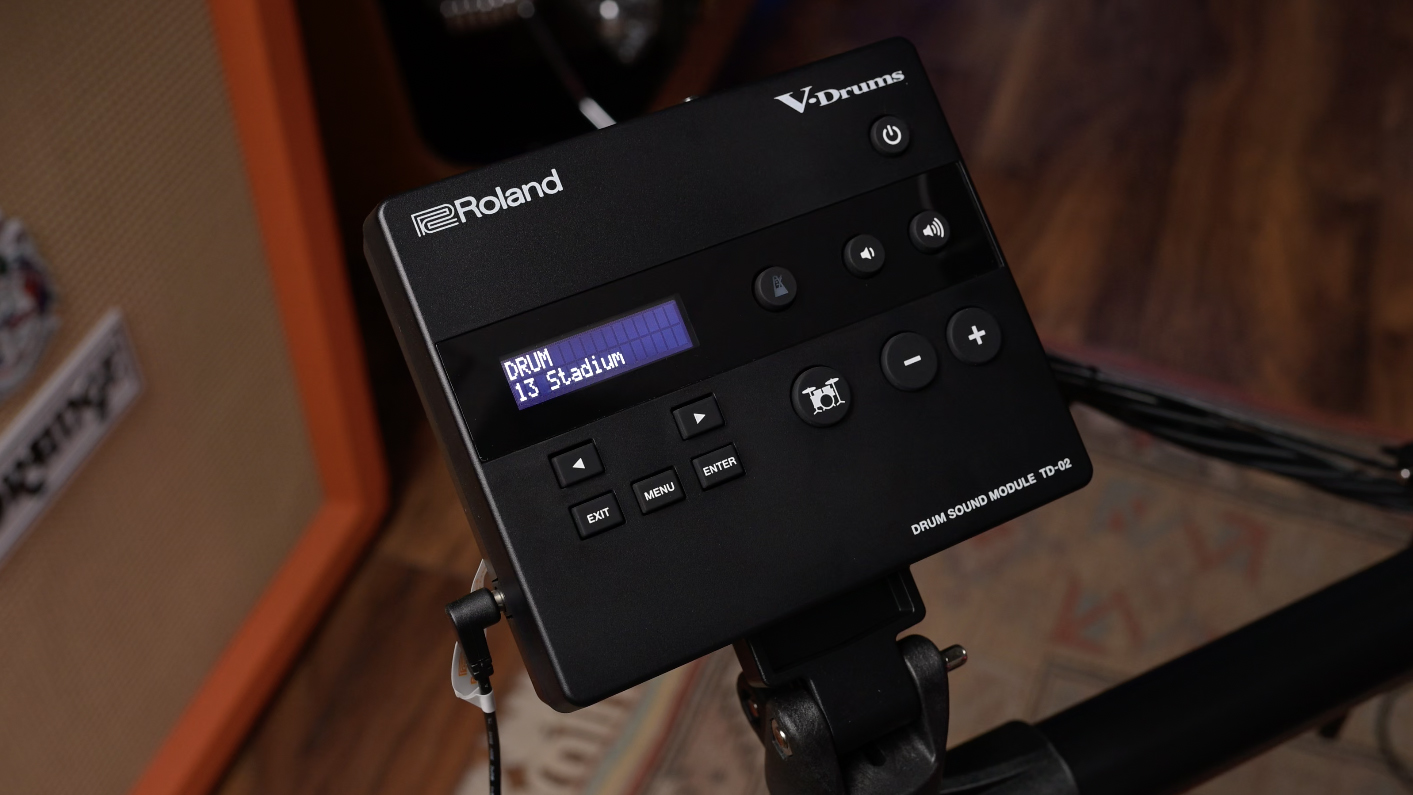
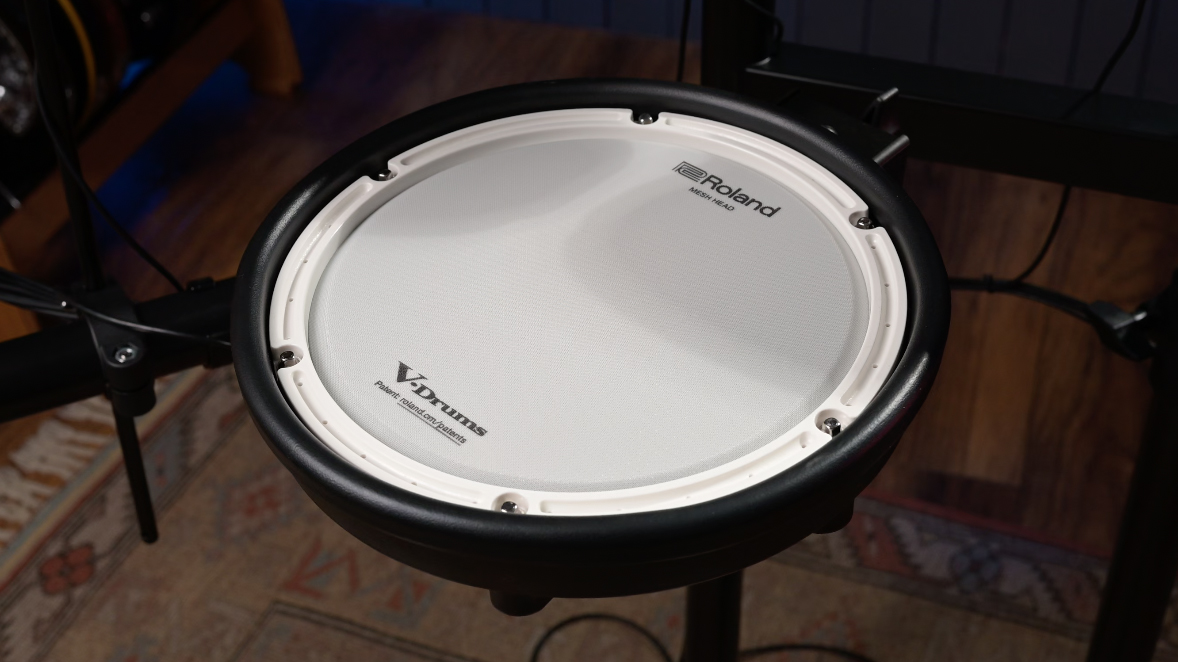
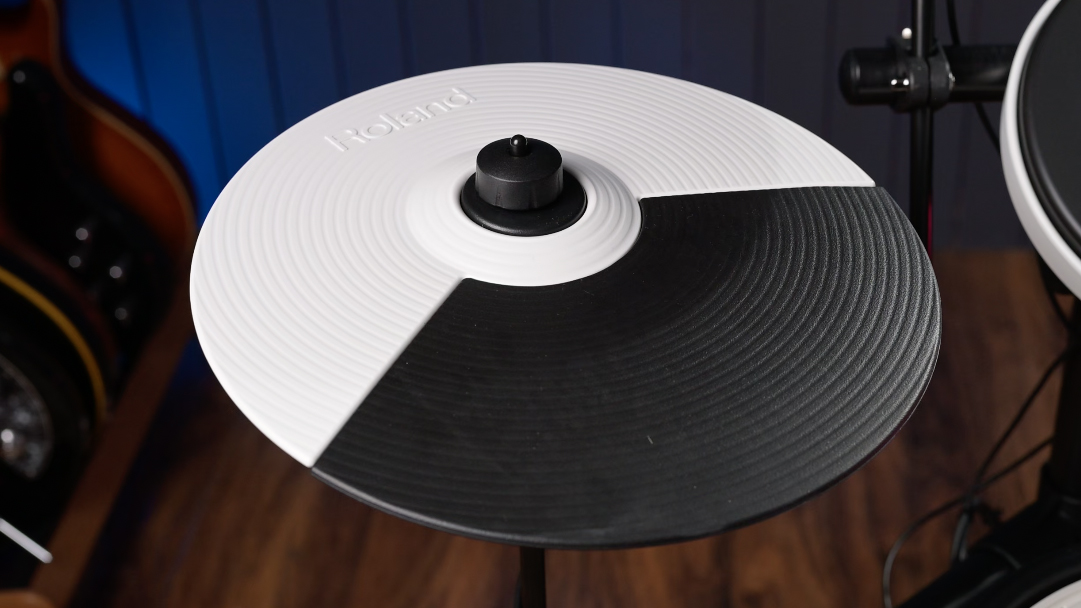
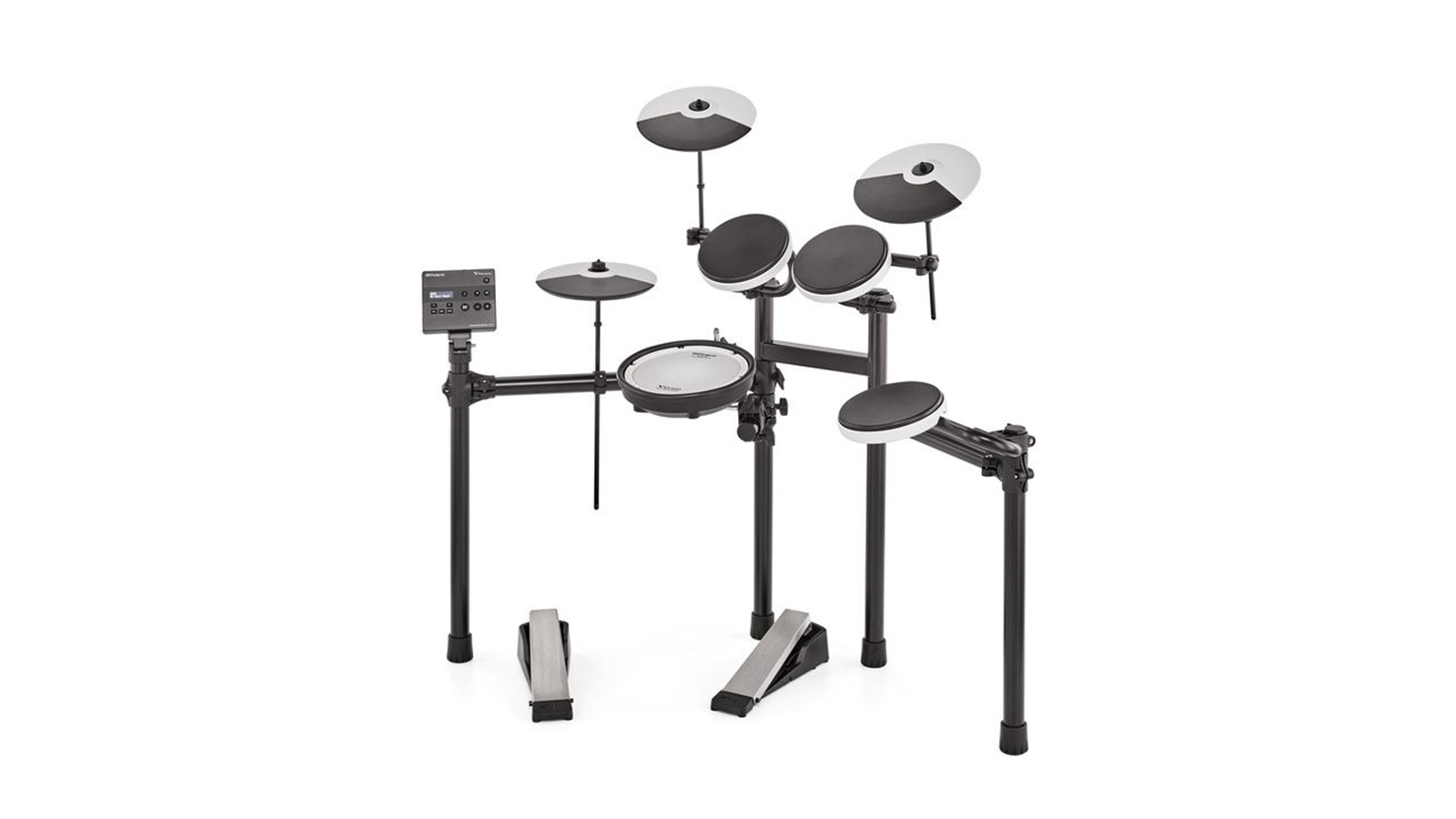
Specifications
Reasons to buy
Reasons to avoid
✅ Buy if you want a kit you can grow with: Roland is the pinnacle of quality when it comes to hardware. If you're sure your kid will stick with it, this kit will be their companion for many years to come.
❌ Avoid if you're on a tight budget: While it's not a total bank-breaker, you will pay a slightly higher premium to get the Roland badge on your e-kit. In our opinion it's totally worth it.
What is it? Roland's latest addition to the V-Drums family is a hugely appealing package if you're just getting started. It features a Roland dual-ply mesh head on the snare, neat and responsive bass drum and hi-hat controller pedals, and studio-quality sounds that are some of the best we’ve heard at this price point. Honestly, kids have never had it better than this kit... if you have the budget.
Features & performance: The TD-02 module also has Bluetooth capability for jamming to your music collection via a smartphone or tablet. You'll need an adapter to use this, which comes at an additional cost, but having grown used to this feature on higher-end kits, we'd say this feature is well worth the extra investment.
There are more affordable options out there, just as there are kits with more sounds and features, however in our tests we found that the TD-02KV represents a cohesive package that you’ll want to sit down at months (and hopefully years) after you’ve bought it. Add to this some comprehensive coaching functions for developing players and it’s clear that Roland has considered who, how and where this kit is designed for.
If you like the look of this kit but want to save a bit of cash, the TD-02K centres around the same module, but comes with a rubber snare rather than mesh and a slightly different rack design, for a pretty chunky saving on the KV model. I would always recommend mesh over rubber, but if the driving force is budget, then a rubber snare pad is not a deal breaker.
Watch our demo video:
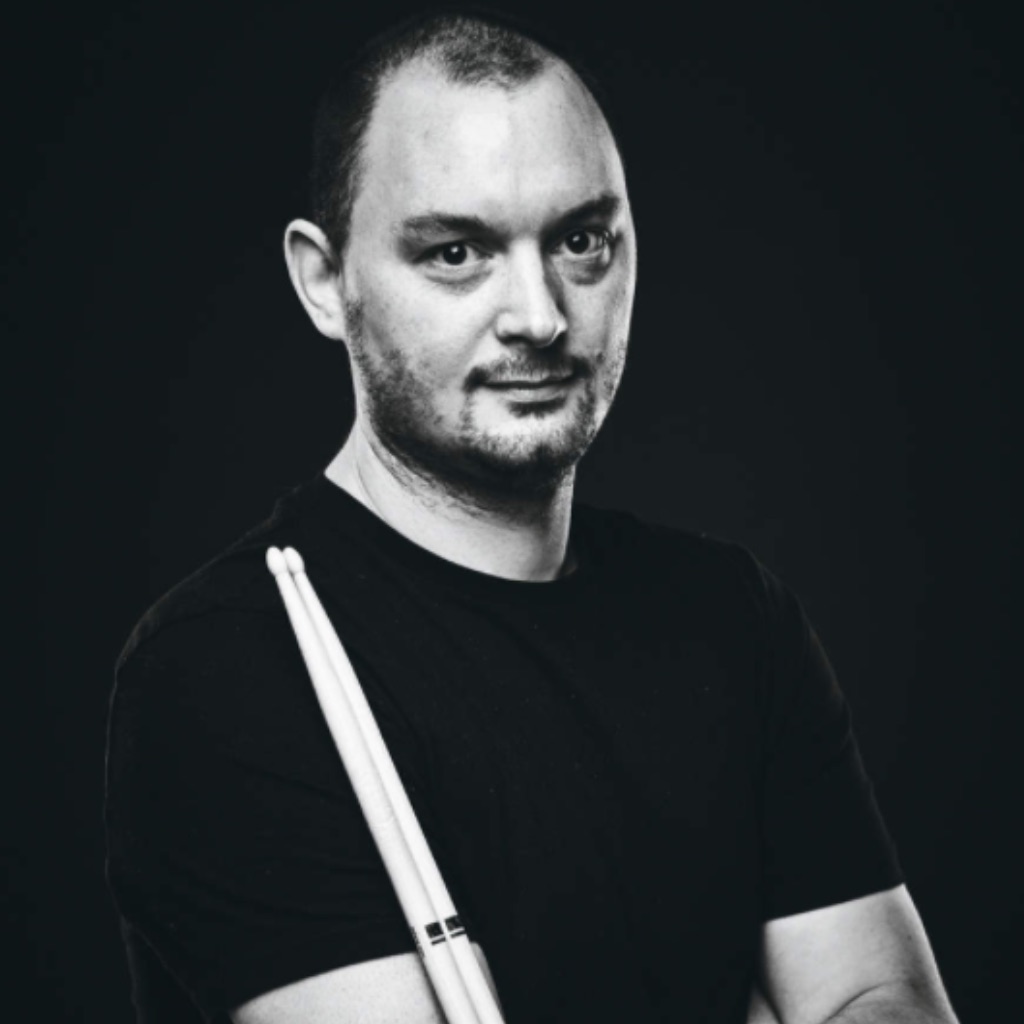
"The TD-02 represents a step up from more generic electronic drum sets with plenty of usable features. It feels and sounds great and while you’ll pay more than some brands, you’ll receive a solid and reliable platform that will take you from beginner to intermediate."
Read more: Roland TD-02KV review
Best value
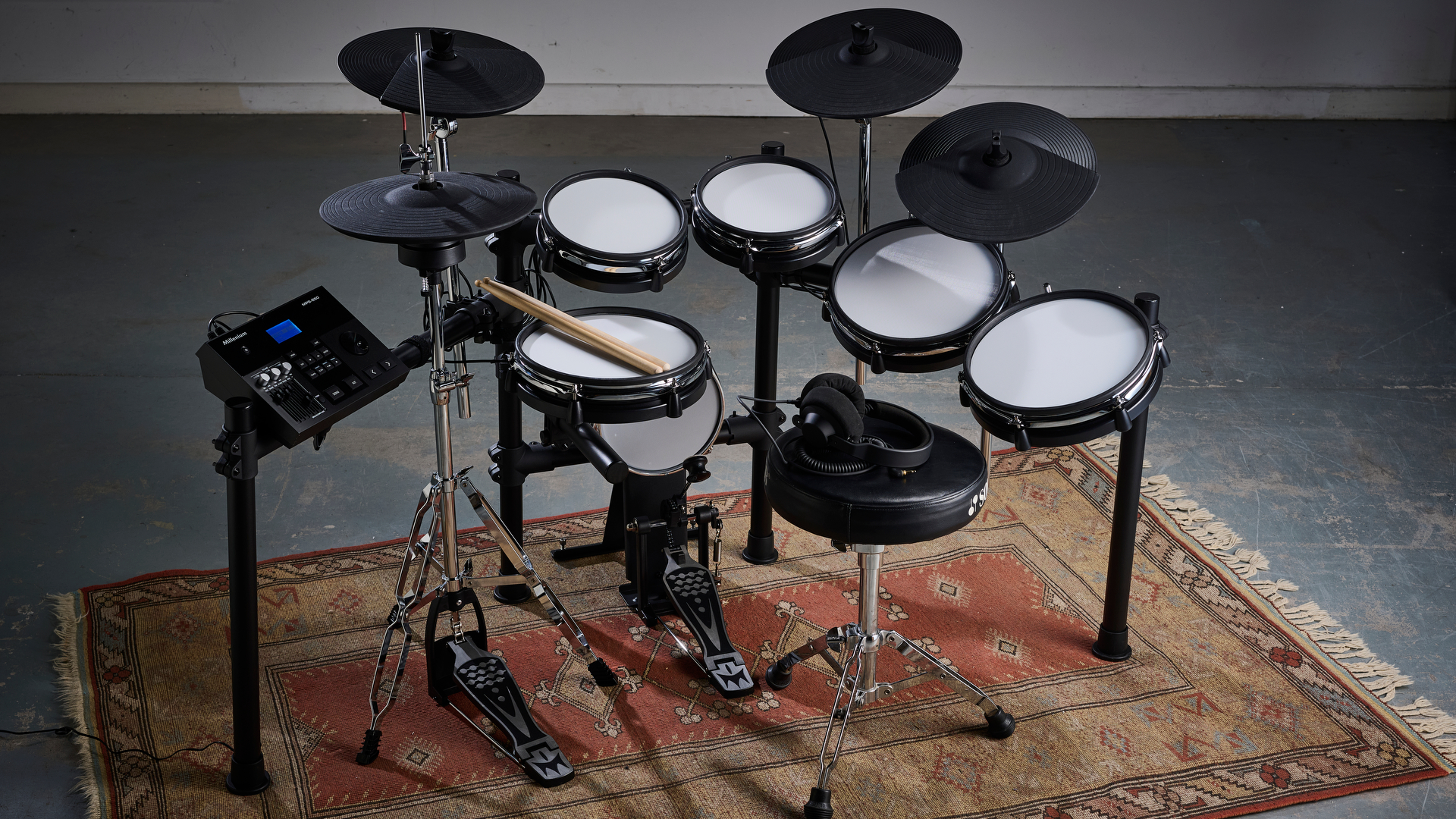
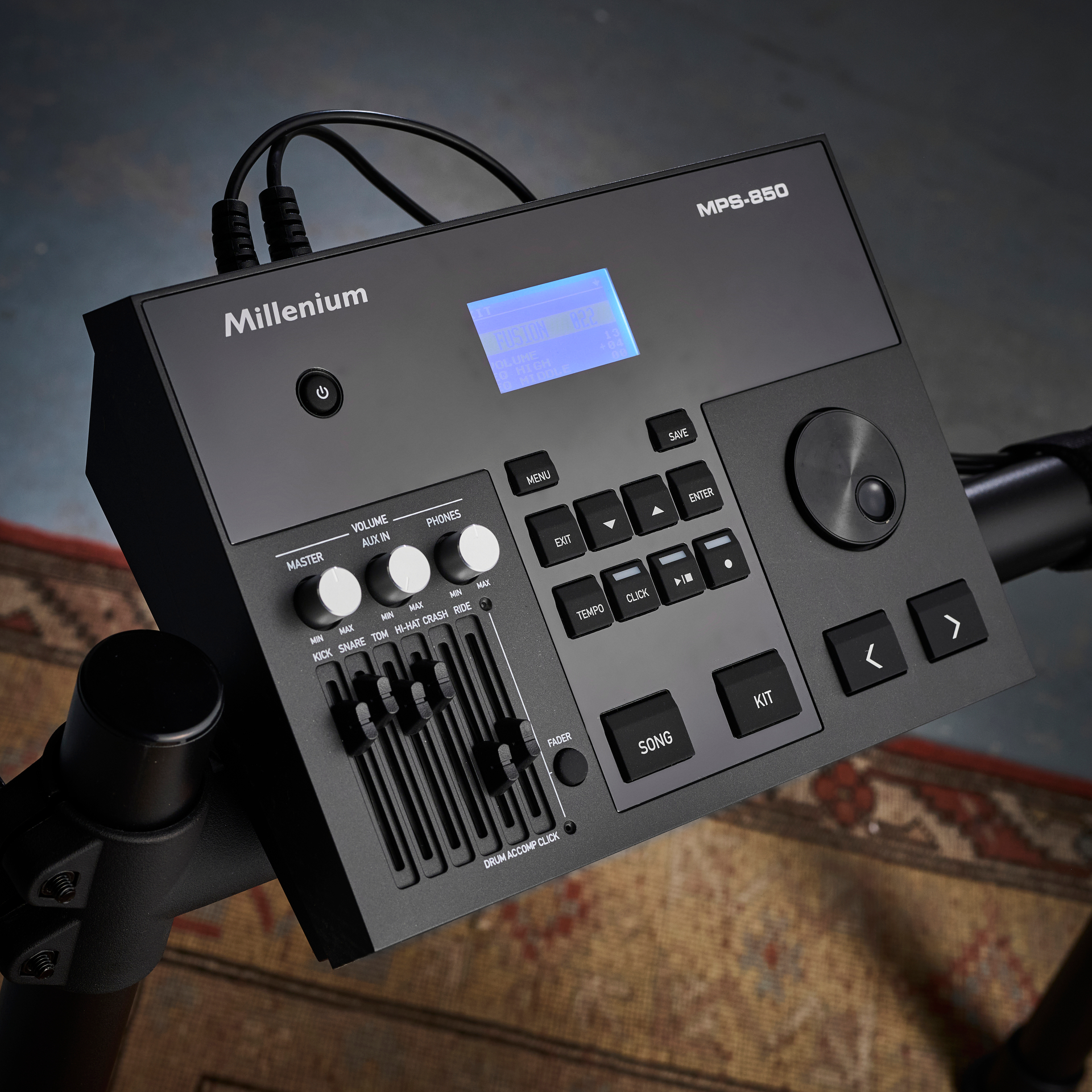
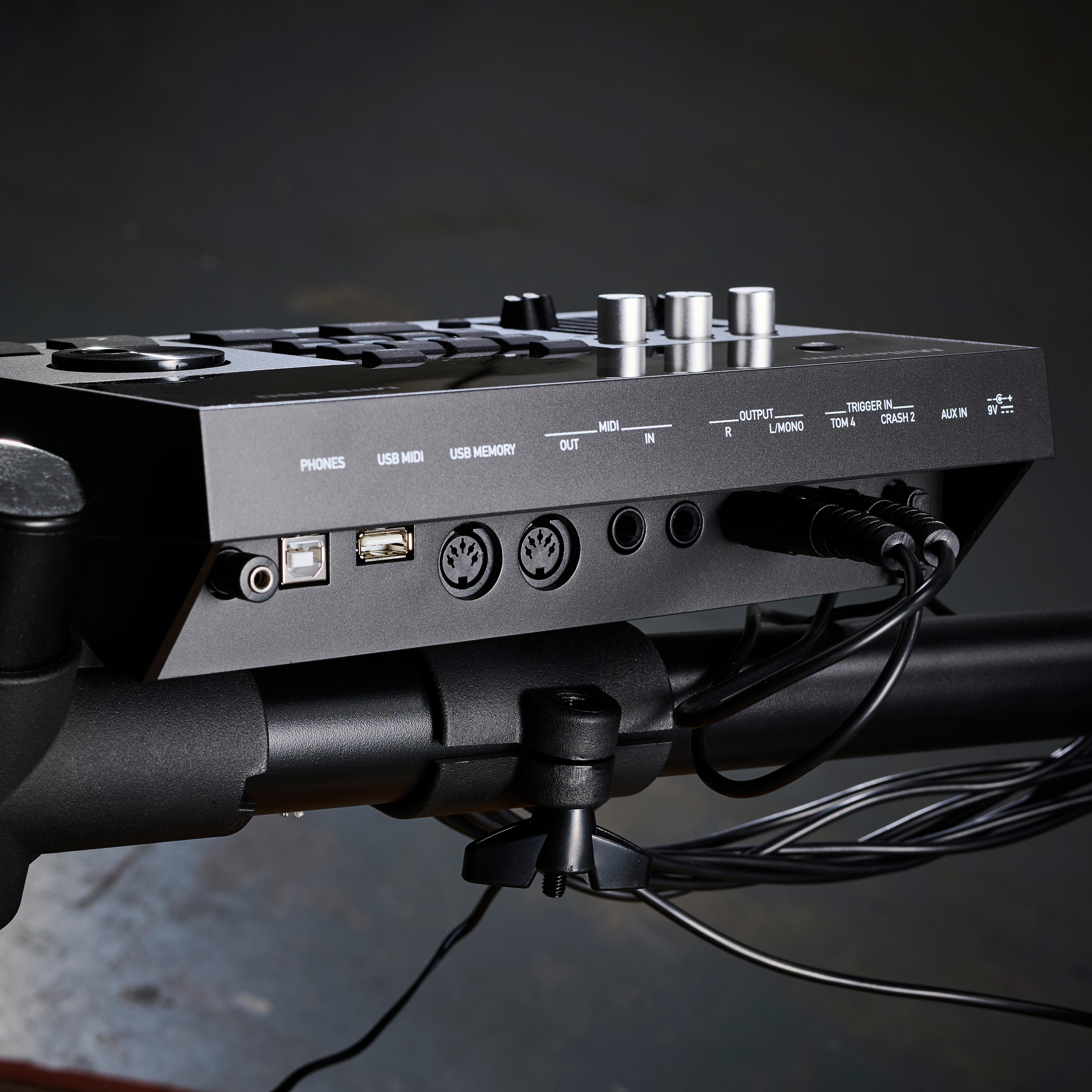
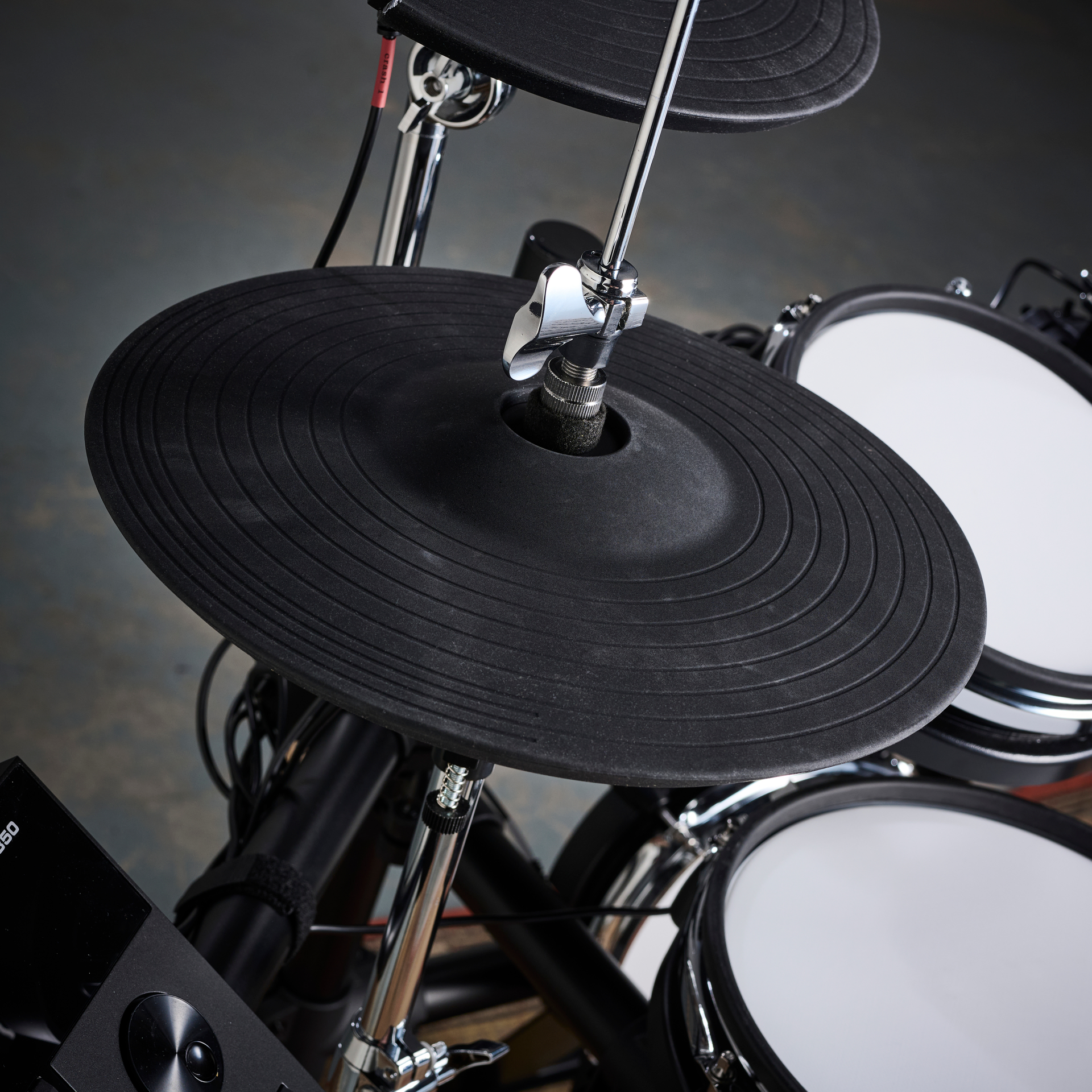
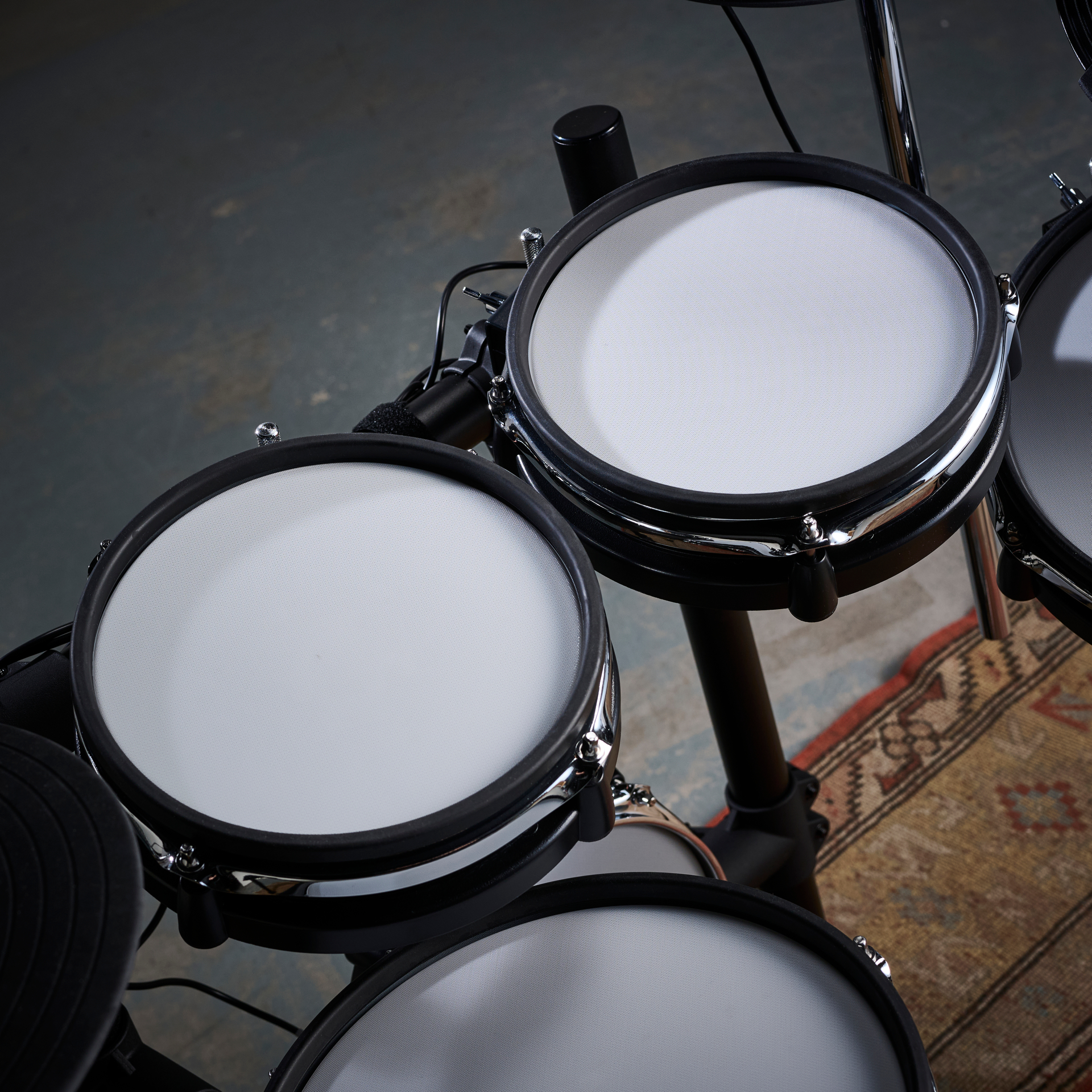

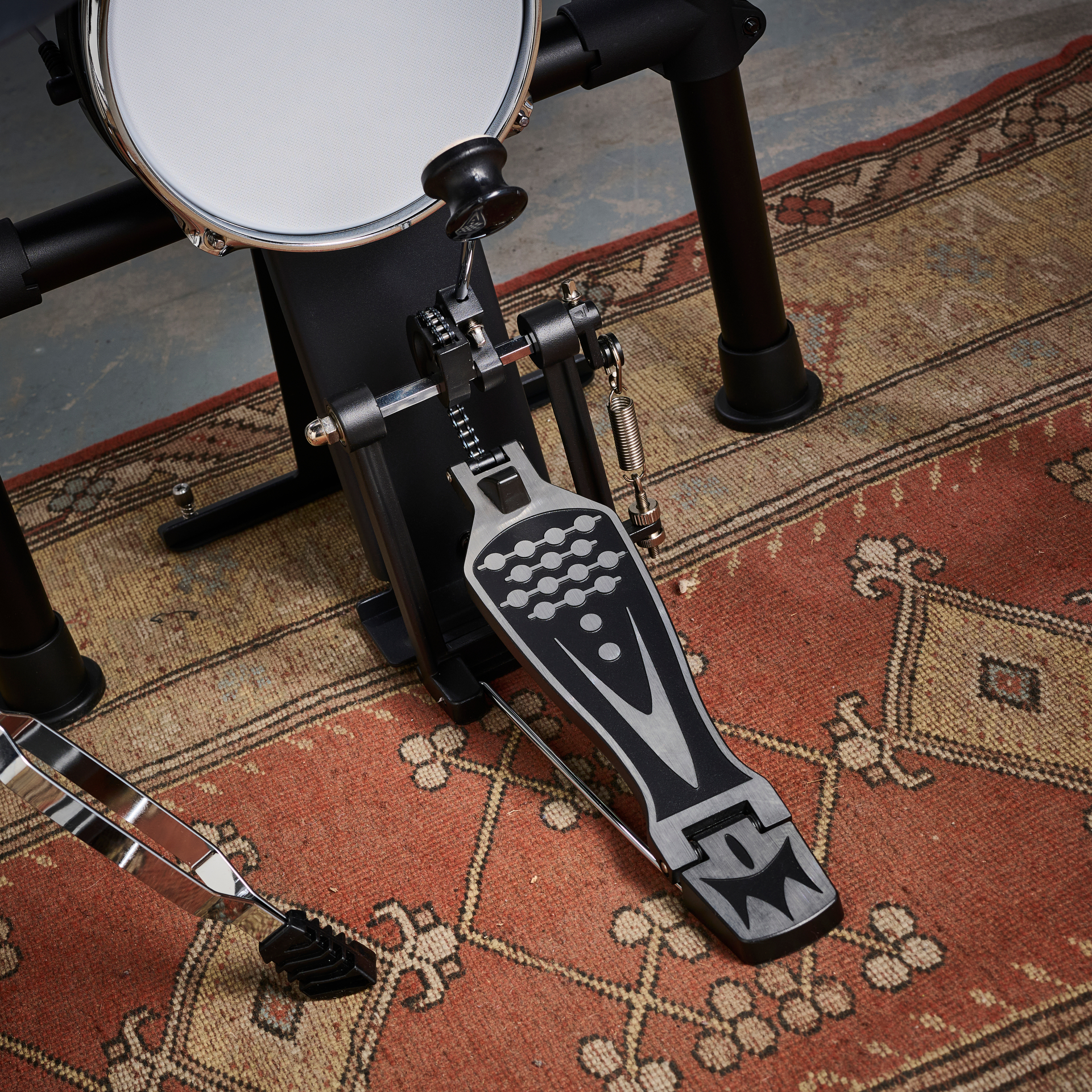
Specifications
Reasons to buy
Reasons to avoid
✅ Buy if you want amazing value for money: You won't find a more well-appointed kit for the money in this guide. This kit is a true gateway to your child getting comfortable behind bigger kits and understanding how a more 'pro' module works.
❌ Avoid if space/size is a huge consideration: Not only might a smaller player struggle with the pad dimensions and sheer scale of this kit, but it will also take up more physical space in your home.
What is it? German retailer Thomann, the brains behind electronic drum brand Millenium, knows a thing or two about producing quality gear for those on a tighter budget. The MPS-850 is no exception, with this e-kit bundle delivering a fantastic value package. The 10-piece kit comprises an array of mesh pads and rubber cymbals and they even throw a bass drum pedal and hi-hat stand into the mix. If you want to get as close to layout of a real acoustic drum set, then this is the one for you.
Features & performance: For us, the biggest selling point of this kit is the module, which is not dissimilar from modules bundled with kits that you’d pay far more for. It’s easy to navigate and create your own custom kits, there are plenty of connections for hooking up to a computer (if you decide to record the kit further down the line) or connecting a smart device for playing along to your favourite music, and the physical faders enable quick mixing of individual parts of the kit. Once you start getting more interested in sound, and the balance between kit parts and how they work with the tracks you're jamming to, you'll find this feature to be hugely valuable.
The only thing to consider here is that the MPS-850 features larger pads than most of the options in this guide (10-inch snare pad, 10-inch and 8-inch tom pads, 12-inch cymbal pads), so may be on the larger side for smaller players. That said, this is a kit to grow into and the rack is very adjustable so can be positioned to accommodate even the most pint-sized players.
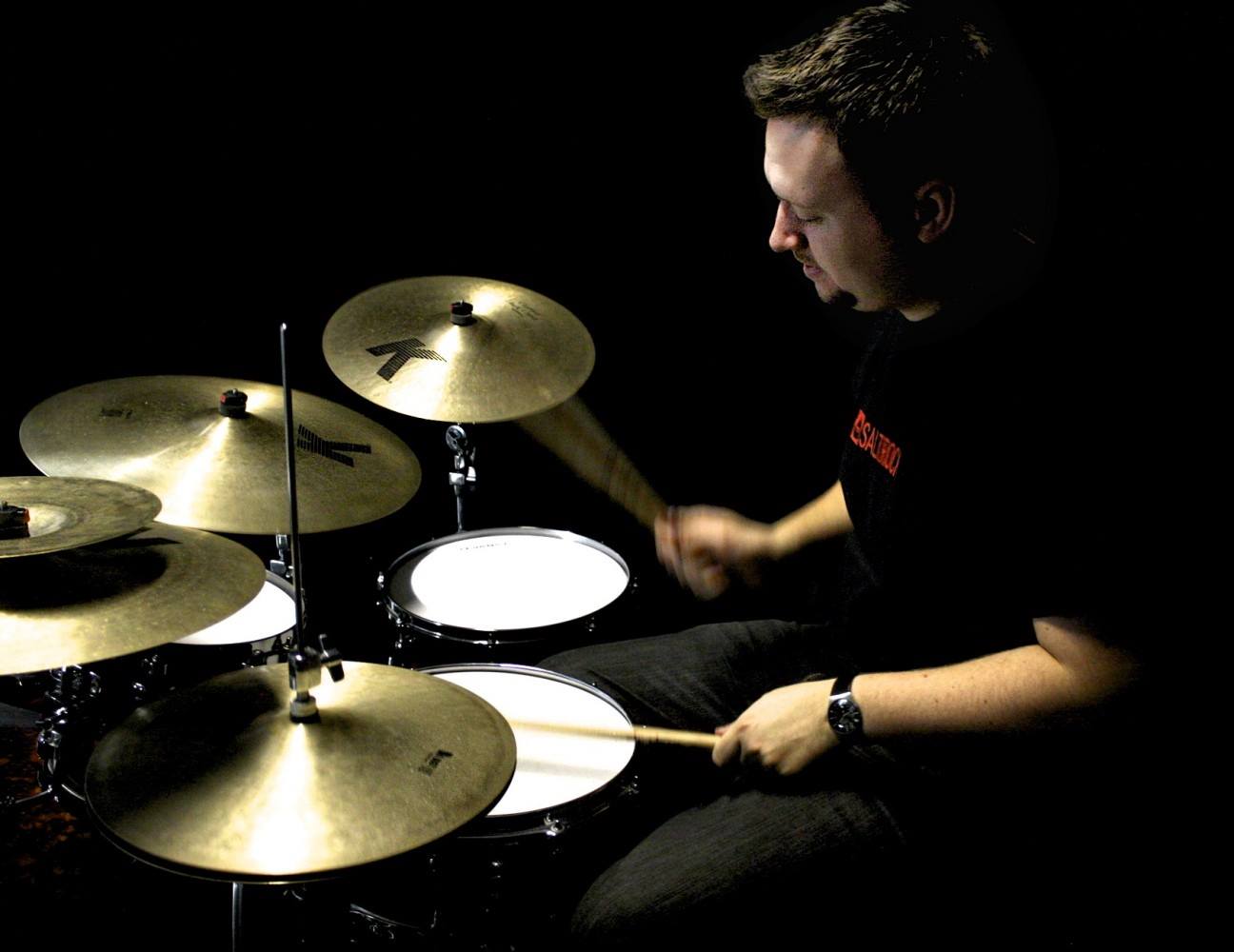
"This generous yet price-conscious package from Thomann’s Millenium Drums includes ten multi-zone drum and cymbal pads, all relevant hardware and a feature-packed module."
Read more: Millenium MPS-850 review
Best budget
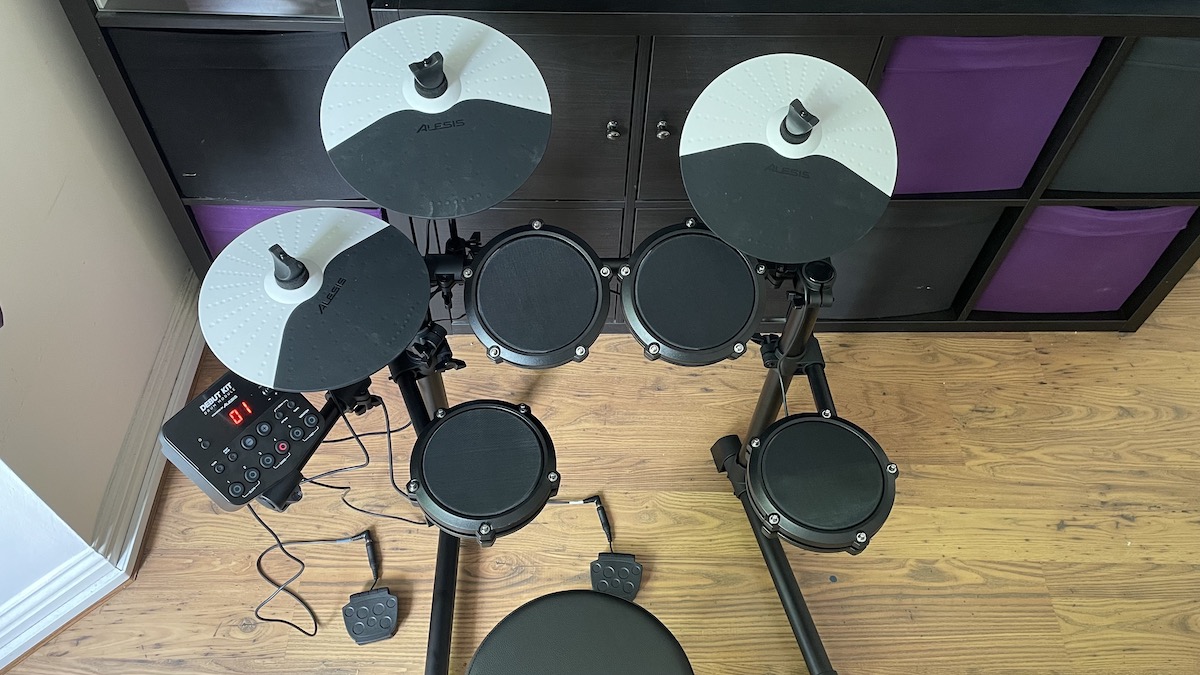
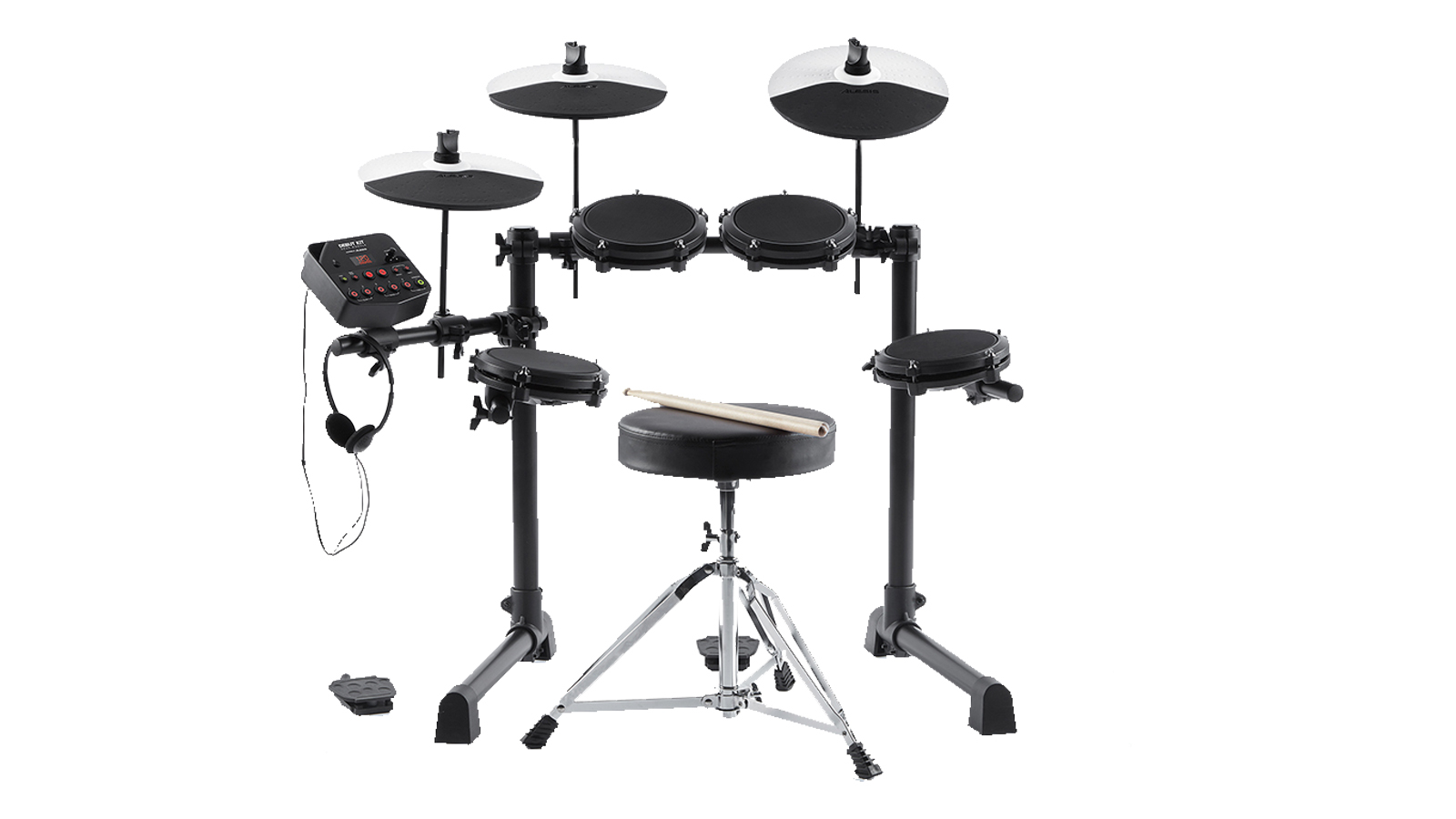
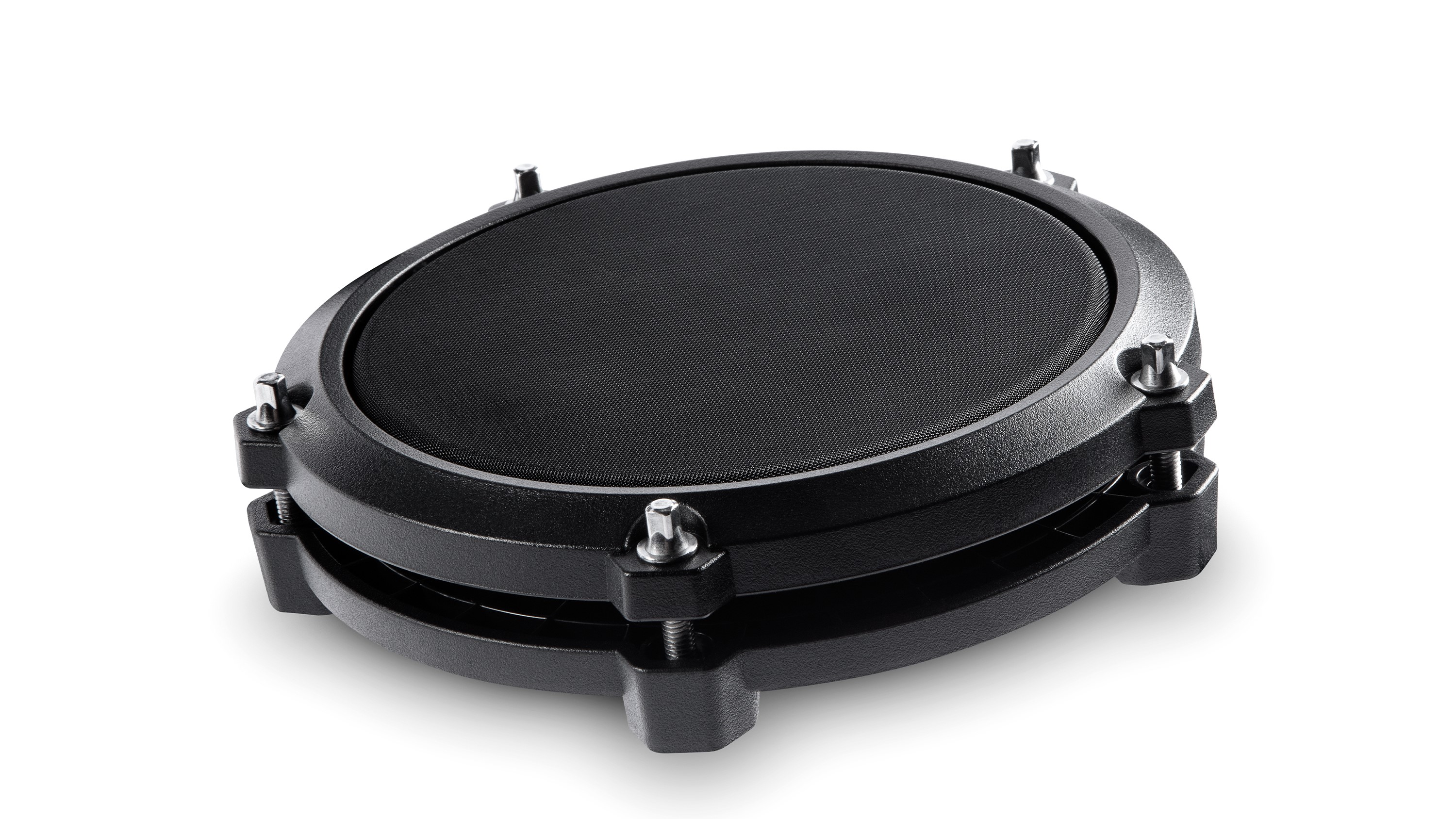
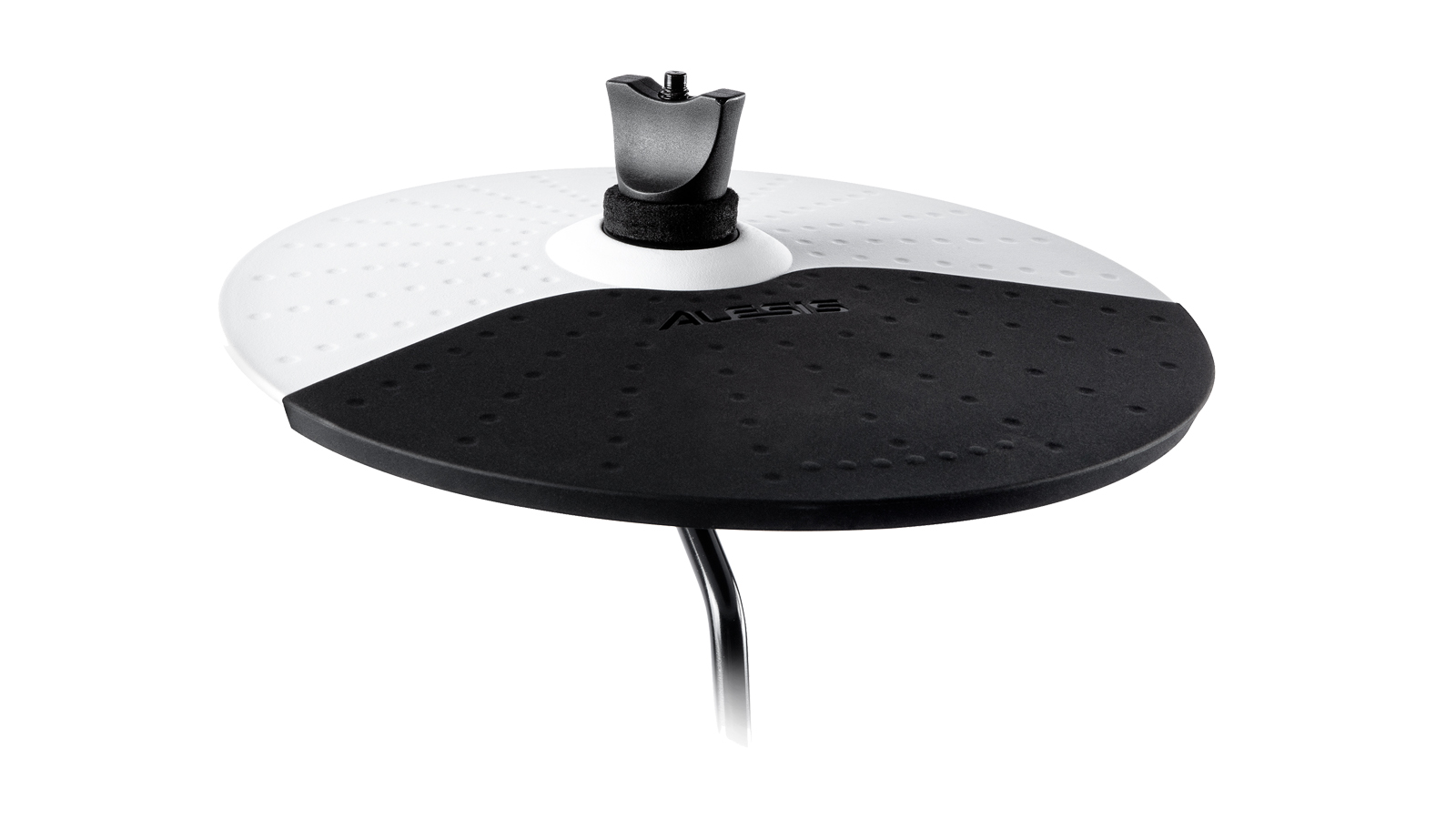
Specifications
Reasons to buy
Reasons to avoid
✅ Buy if you want everything you need in the box: We love that this kit provides everything you need to get started - sticks, headphones and a stool. It's the epitome of unbox, plug and play e-drumming.
❌ Avoid if you want their kit to last a while: There are obvious limitations to this kit in terms of dimensions and quality of sounds, so if you think your little one is in it for the long-haul, we'd look elsewhere.
What is it? We love Alesis drums here at MusicRadar. They have always been excellent when it comes to value for money and the Debut only reinforces this. For ~$300/£200, the Alesis Debut delivers everything you need to start your drumming journey. Thoughtfully, it includes a stool, sticks and headphones, as well as a comprehensive metronome and Melodics learning software bundled in.
Features & performance: The drum heads are mesh instead of rubber, which is a far better and more realistic option. The module has 120 sounds on board, divided up into 10 kits, as well as 30 songs to play along to and smartphone compatibility; meaning you can play along to your favourite music on apps such as Spotify.
With a generous amount of features at a very low price, this kit feels like an open-arms invitation for children and beginners to enter the world of drumming. Solid build quality, Melodics software and the succinct learning tools on board the module will provide brand new drummers a jumping off point to help build vital rhythmic foundations. If you have the budget, we'd suggest you stretch to our #1 pick the Alesis Turbo Mesh, but if that's out of reach, this is an excellent entry point into the world of Alesis drums.

"Despite the cute appearance, the Debut kit is not a toy but in fact a fully functioning electronic drum kit that represents a decent package for the price – the only thing we struggled with was the pedals."
Read more: Alesis Debut review
Best all-in-one pads
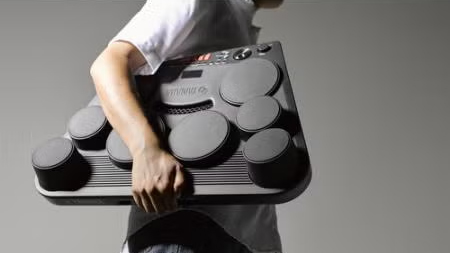
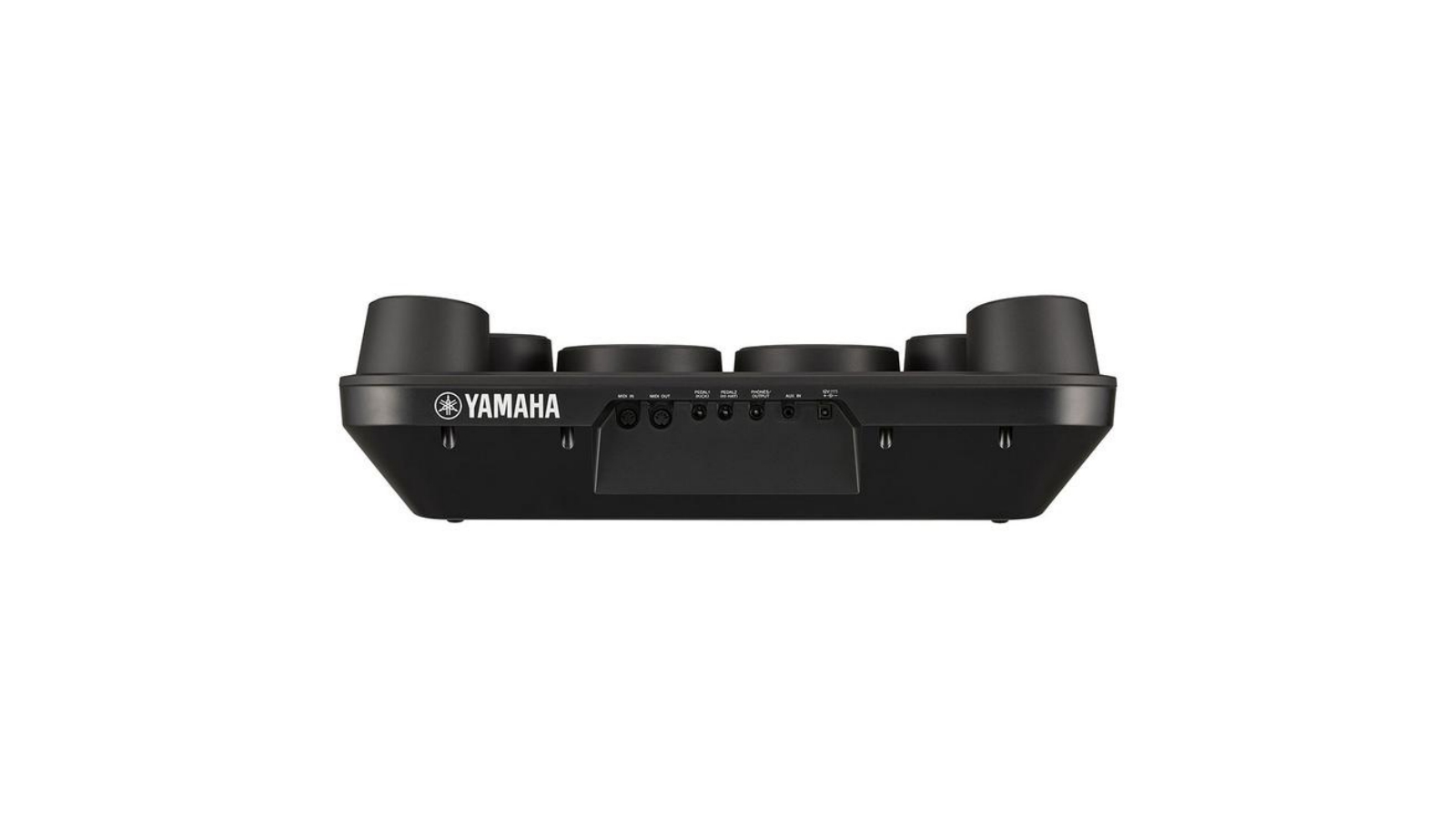
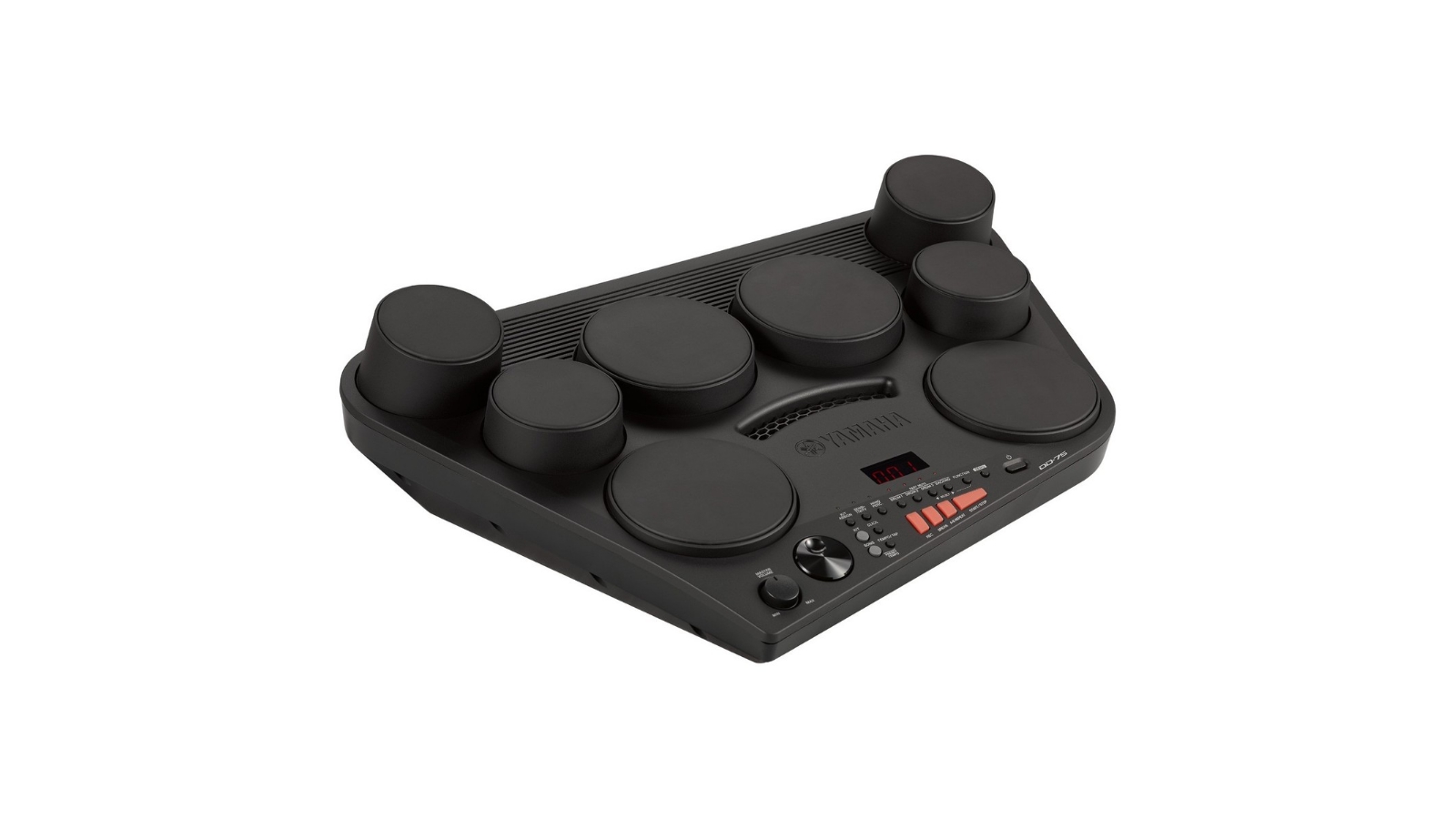
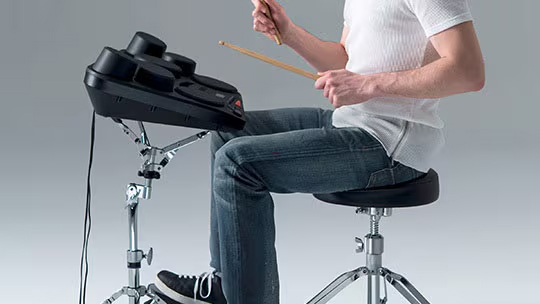
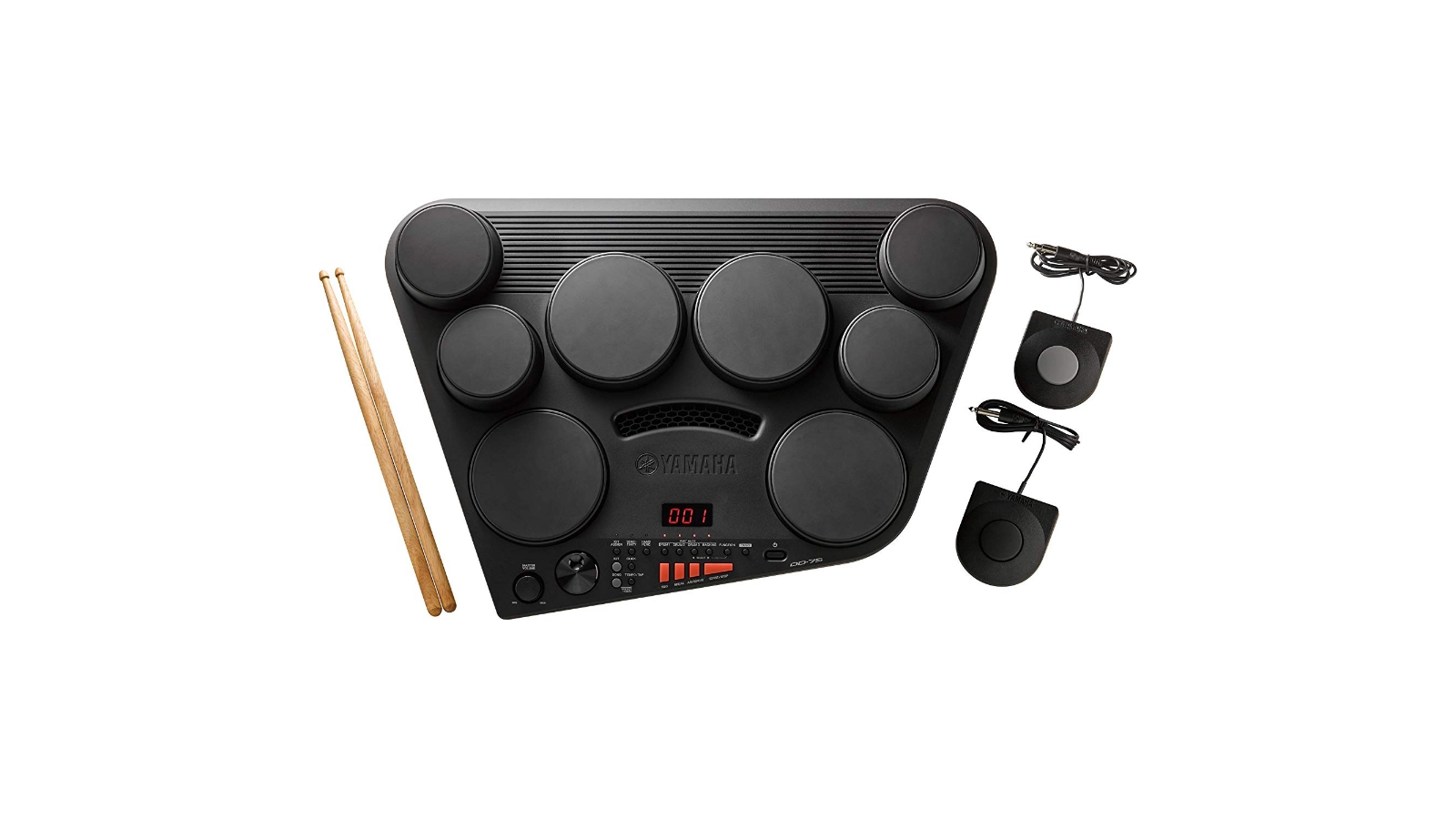
5. Yamaha DD-75
Our expert review:
Specifications
Reasons to buy
Reasons to avoid
✅ Buy if you want a basic but capable intro to drumming: There's no competition between this and a full electronic drum set, however this would make for an excellent, compact tool for leaning how to generate drum sounds and piecing together basic beats.
❌ Avoid if they want a full kit: And we don't blame them... If aspirations are to be the next Dave Grohl, then this is not the place to start.
What is it? If you lack the space, or your child isn’t quite big enough for a full-size electronic drum set just yet, a compact desktop kit like the DD-75 from Yamaha is a great entry point into the world of percussion.
Features & performance: It’s portable, too. While it won’t feel like a full kit, the position of the eight rubber pads introduces new players to the layout of a drum set, while two supplied pedals - albeit flimsy and not the most responsive - take care of bass drum and hi-hat control.
Pads are responsive enough that most techniques can be played on them. The DD-75 has its own module of sorts, loaded with 75 pre-configured kits and 570 sounds which can be assigned to the pads – being Yamaha (makers of some of the best Yamaha electronic drum sets) sounds are mostly of great quality so there's nothing to worry about there. The unit comes with a pair of sticks too, so it's ready to rock right from the box.
How to choose the best e-kit for kids
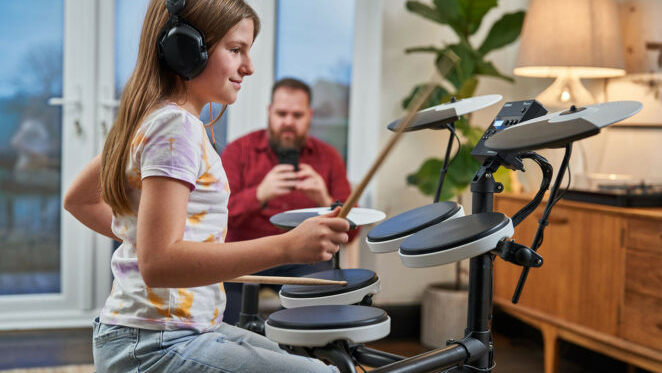
In our experience, there are a number of factors to consider when shopping for an electronic drum set for kids. Many of these factors we also take into consideration during out testing process:
1. Configuration
By this we mean both the number of pads and the layout. At the very least you will want a kit with a snare pad, three tom pads, three cymbal pads (hi-hat, crash and ride), plus either a bass drum pad and pedal or bass drum controller pedal. Some kid-friendly kits offer a larger number of toms or cymbals than this, but you'll go far with this base configuration. In terms of layout, you'll want to check that you can position the pads ergonomically so you're not reaching too far to strike a pad, or that the pads aren't too close together.
2. Size
What space do you have for a kit? This will dictate which of the kits in this guide to go for. Some are compact and take up very little room, where others are sprawling and will need plenty of space to accommodate. Some racks can also be raised as your child grows.
3. Sounds
Most kits at this level will come with a large selection of sounds within the module, which can be fun to experiment with, but outside the fun cartoon sounds and electronic kits, at the very least you will want a quality acoustic drum sound.
4. Coaching tools
While younger drummers might not be so keen on formal learning, or playing along to a metronome, coaching tools can add an element of challenge to their playing, in some cases gamifying practice sessions and giving them targets to beat.
5. Budget
Probably one of the most pivotal factors at this level. What's your budget and what do you get for your cash? If you don't want to spend a huge amount, we would recommend you choose a kit that delivers everything in the box; kit, pedals, sticks and headphones.
Need more help?
Our video covering more e-kit buying tips should answer any further questions you have.
FAQs
How do kid’s electronic drum sets work?
A starter electronic drum set consists of a series of rubber or mesh trigger pads, representing tom toms, snare drum, cymbals and bass drum. Pads are mounted to a rack, along with bass drum and hi-hat pedals on the floor. Everything connects to a module which contains a selection of sounds which trigger each time a pad is struck with a drumstick.
Because the sounds are simulations as opposed to real noises, they need some form of amplification in order to be heard. As such, headphones for drummers are the best choice for kids; although a personal electronic drum amplifier can also be used for those who want to play out live and loud.
Sounds are housed on a drum module (or 'brain'). Most modules come with pre-configured kits aimed at different genres of music. Some modules also feature slots for 'user kits' so the player can create their own custom kits mixing and matching the sounds on-board the module.
What comes with a kid’s electronic drum set?
When you’re buying your first beginner electronic drum set, almost everything usually comes in the box. That means the kit itself - including pads and the rack - plus hi-hat and bass drum pedals and a pair of drumsticks. If you’re lucky, a pair of headphones may also be bundled. The one thing you probably won’t get is a drum throne, which you’ll need to budget for on top.
Do e-kits come with educational tools?
Most electronic drum set modules - especially those aimed squarely at kids - will offer developmental tools to help direct those first 20 or so hours of practice. Such training programs will focus on precision and timing; two fundamentals of drumming. The essential metronome will be there to give a steady hand to keep young players in time. You’ll also often find built-in backing tracks to jam with, plus smartphone connectivity for playing along to songs on Spotify, YouTube or other streaming services.
Does my child need a full-size electronic drum kit?
In an ideal world, the answer is yes. The best way for a child to get used to the layout of a drum set is to experience the real thing from the word go. If you’re concerned about the kit being too big to begin with, it’s worth noting that electronic drum sets feature plenty of adjustment options for both the rack system and pad positioning, so you can set everything up close at hand when your child is first starting out, then move them further away as they grow.
Many of the full kits featured in this guide are also designed to be compact, as well as foldable, so they can be tucked away in a corner or moved from room to room.
If space really is an issue, you might want to consider a compact desktop kit. First and foremost it is important to note that these don’t do the proper job of getting a child used to the way a drum kit is ergonomically laid out; since they are flat pads as opposed to a full kit. If this doesn’t bother you, or even if you are looking at introducing your child to percussion as opposed to full kit drumming, definitely keep this option open.
What is a good age for kids to start learning the drums?
In short: as soon as they express more than a passing interest. If your child is tapping away on any surface available whenever they hear a catchy rhythm, perhaps it would be a good idea to see if they enjoy transferring this to drumsticks and one of the kits listed in this guide. For some kids this might be age four, others age 12. It really depends on when they’re inspired and what inspires them.
One scroll through YouTube will show you that there are kids around the world, of all different ages, who have a passion for the drums. What this highlights is that there is no “right age” per-se, to begin learning the drums. Only that when a child does show a level of interest, it would be a very good idea to nurture this as early as possible.
Where should kids start when learning the drums?
At the early stage, having fun is the most important element of learning the drums. If it’s not fun, they won’t stick with it for long. Playing along to songs via Spotify and YouTube, or the backing tracks supplied on your module, is a great way to engage with the drums - and it’s super easy to connect a smart device via the mix-in connection that comes as standard on every e-kit module, or even via Bluetooth which is become a common feature on newer kits. This could start as simply as aiming to match the snare drum hits in a song (a band like AC/DC and their drummer Phil Rudd are a great starting point), before building up to introduce the bass drum and hi-hats as their coordination improves.
Another area that kids should learn in tandem with this is rudiments. These are the building blocks of rhythm, and practicing these will help drummers train certain muscles and help them feel more natural behind the kit. They could start with something as simple as a 4/4 metronome going at 90BPM, and hitting alternating sticks between left and right hands on the snare drum pad in time with every beat. From here they can branch out into double strokes with each hand, before exploring more complex rudiments like the paradiddle.
From here we would recommend utilising the basic training programs included on most modules to improve time-keeping and accuracy. The more of this they do, the more they will be able to jam with music (and other people!). Of course, all of this can be done even more effectively under the watchful eye of a qualified drum teacher.
At this entry-level the quality of sounds, hardware and pad response won’t match more expensive electric kits that boast mesh heads and more powerful modules, however the options in this guide represent an accessible, affordable and feature-packed starting point for budding drummers.
Which brands make the best e-kits for children?
There are countless kid’s electronic drum sets online, but not all are created equal. The child-friendly options from brands like Alesis, Roland and Yamaha are a great place to start if you’re looking for a respected name with a strong pedigree from child to pro level. Other brands worth exploring include Millenium, Digital Drums and Simmons.
How much should I spend on an electronic drum set for my child?
You don’t have to spend a huge amount to get yourself a quality electronic drum set for kids. As evidenced in this guide, spend between $250/£199 and you’ll get your hands on a perfectly functional e-kit with basic versions of all the features you’d want at this level. Push your budget a little more and you’ll be into the realms of well-known brands like Alesis.
Naturally the more you spend, the better the hardware and the more impressive and realistic you’ll find the sounds on the module. Push your budget up to around $/£500 and you’ll be able to get your hands on a kit bearing the Roland name - now you’re in serious e-kit territory.
If these figures are well out of your price range, a desktop kit like the Alesis Compact Kit 7 is a more cost-effective introduction to drumming. However, you may find it will need upgrading to a full kit sooner, so could be a false economy.
Glossary
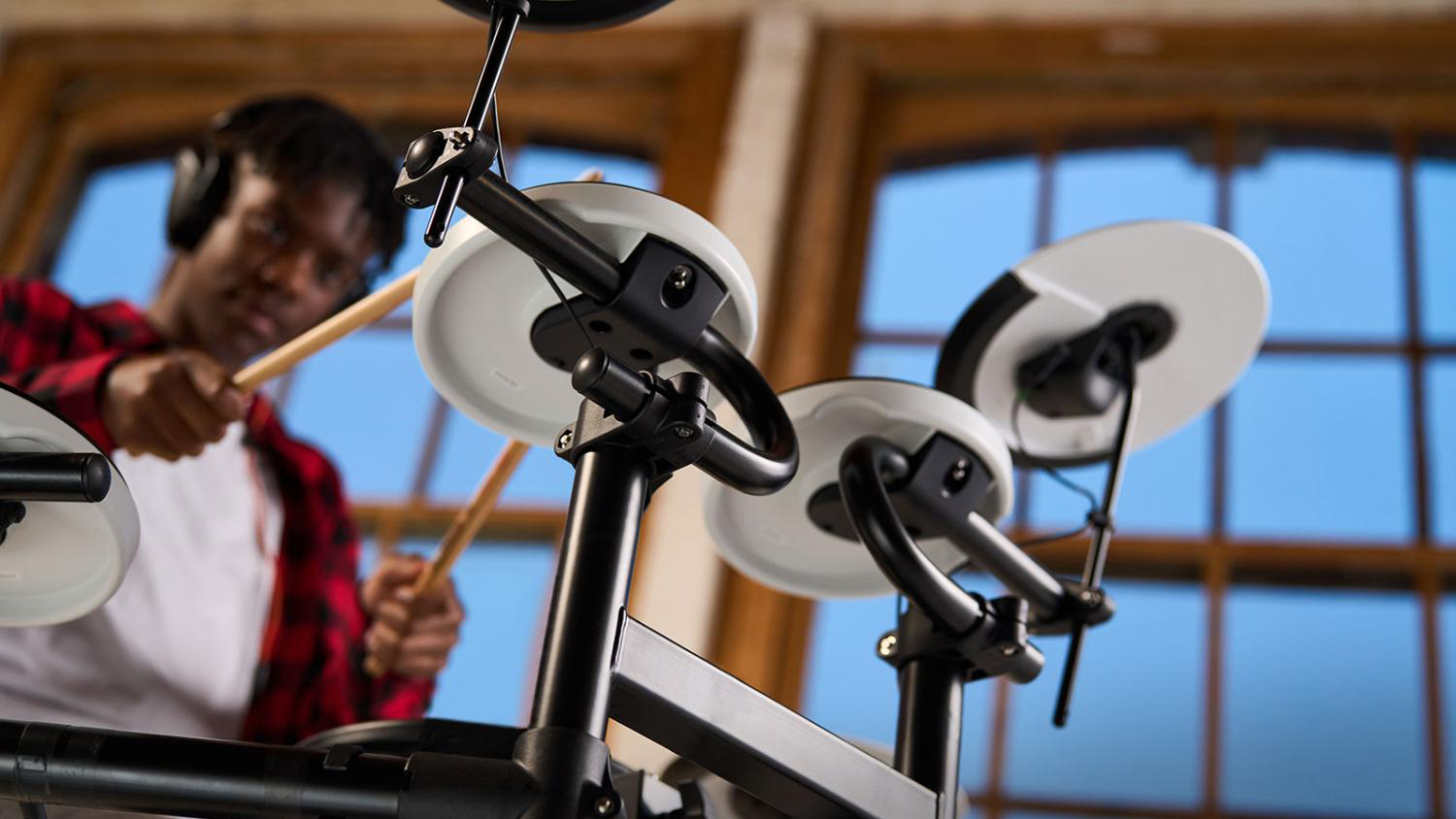
Unsure about certain terms used in this guide? Here's what they mean:
Aux input: A jack for plugging in phones or other smart device so you can play along to music. An indispensable way to get new drummers to fall in love with drumming.
Bass drum controller pedal: A self-contained pedal that digitally simulates a bass drum beater hitting a pad. It's not the optimal approach, but it saves needing a separate pedal and bass drum pad.
Coaching mode: Built-in lessons or practice tools to help improve timing, speed, and coordination.
Cymbal choke: A feature where you can grab the cymbal to stop the sound, just like with acoustic cymbals.
Dual-zone pads: Pads that can produce two different sounds depending on where you hit (eg. rim vs centre).
Hi-hat controller pedal: Simulates open/closed hi-hat playing. Some kits offer better expression and realism than others.
Latency: The small delay between hitting a pad and hearing the sound. Good kits have very low latency so this delay is not noticeable.
Mesh pads: Drum pads made from woven synthetic mesh. They’re quieter and more responsive than rubber pads, offering a closer feel to acoustic drums.
Module (brain): The control centre of the kit. It houses all the drum sounds, settings and inputs/outputs.
Rack: The frame that holds the kit together.
Rubber pads: Pads with a solid rubber surface. Often cheaper and longer-lasting, but typically louder and less realistic in feel.
Triggers: Sensors inside the pads or cymbals that detect hits and send that information to the module to produce a sound.
USB/MIDI output: Lets you connect to a computer or other digital equipment. Useful for recording, triggering drum software or online lessons.
How we test kid's electronic drum sets
We've reviewed thousands of products since MusicRadar launched in 2007.
The MusicRadar electronic drum set review process is editorially independent and not influenced by any third parties. Our review samples are almost always sourced directly from the manufacturer or via a local distributor. Sometimes review samples are supplied by retailers, or in rare cases we will pay for a product with our own cash.
Our expert e-kit testers use each featured kit for at least two weeks, evaluating the instrument in the following categories:
- Ease of use/setup
- Sounds
- Build quality and durability
- Connectivity
- Other features
This enables us to produce accurate, well-balanced and real-life kid's electronic drum set reviews to help you easily figure out whether the kit you’re interested in really is the best choice for you.
Our testing criteria in detail:
- Ease of use/setup: How easy is the kit to construct out of the box? Once built, how easily can the kit be adjusted to fit the setup needs of the average drummer? Is the module user-friendly?
- Sounds: What level of quality are the supplied sounds? We’re not necessarily looking at quantity here. A large number of sounds is often an attempt to cover up a lack of quality. We’re also looking at the variety of sounds on offer, and the level of editing functionality for those sounds.
- Build quality and durability: Here we assess the physical feel of the pads/cymbals and the response of the playing surfaces. Are the components - such as wing screws, cymbal arms, ball and socket joints, module mounts - of an adequate quality and designed to last?
- Connectivity: How easy is it to connect pads to the module? Is there an opportunity for expansion with more pads? Is there also USB/MIDI connectivity for recording?
- Features: What additional features come complete with the kit or module and how well do they work? For example, many e-kits now feature Bluetooth connectivity, but how reliable is it and how easy is the connection process? Is it possible to add your own sounds to the module? If so, how easy is this process?
Read more about how we test music making gear and services at MusicRadar.
Why trust us
☑️ MusicRadar established 2007
☑️ Over 5,000 reviews on-site
☑️ 85+ e-kits reviewed
Our testing team includes expert reviewers with decades of hands-on experience testing and owning a wide range of electronic drum sets from every notable brand, and with a deep understanding of e-kit technology as it has evolved.
Amongst our testers are industry professionals who have worked in the drum/music industry for decades, including Editor positions for leading drumming magazines and websites. Some of our reviewers are also drum teachers.
For the perspective of selecting electronic drum sets for kits, we also got the opinion of parents on the team who have experience shopping for instruments for their own children.
Latest updates
07/11/25: The main change we've added to this guide is adding video demos of the top two kits in this guide from Alesis and Roland. We filmed these in our own studio in Bath, UK. We've also added a video we created covering buying tips for beginner e-kits to help you narrow down your choices. Finally, we've added a glossary explaining all the key terms we've used in this guide.
Read more:
MusicRadar's got your back
- Get started with the best drumsticks for beginners
- Best electronic drum amps and monitors: play your e-kit out loud!
- Essential drum accessories every player needs
- Get them something awesome with the best gifts for drummers
Want all the hottest music and gear news, reviews, deals, features and more, direct to your inbox? Sign up here.
I'm MusicRadar's eCommerce Editor. In addition to testing the latest music gear, with a particular focus on electronic drums, it's my job to manage the 300+ buyer's guides on MusicRadar and help musicians find the right gear for them at the best prices. I dabble with guitar, but my main instrument is the drums, which I have been playing for 24 years. I've been a part of the music gear industry for 20 years, including 7 years as Editor of the UK's best-selling drum magazine Rhythm, and 5 years as a freelance music writer, during which time I worked with the world's biggest instrument brands including Roland, Boss, Laney and Natal.
